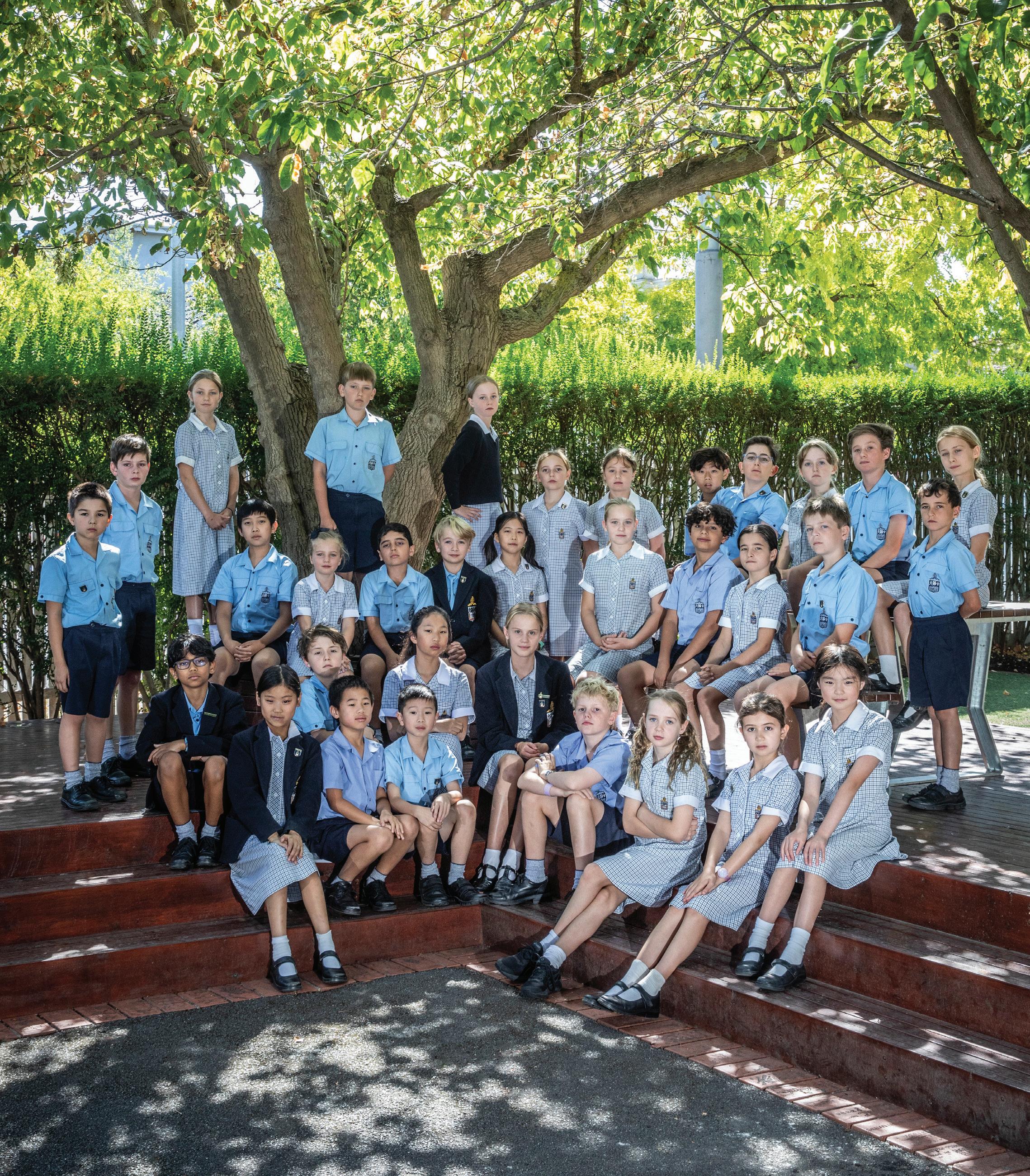
Grammar News Edition 147 April 2024
Grammar News is changing
Grammar News aims to connect and inform our School community, present news about Old Melburnians, and explore the ideas that are shaping our School and leading us towards new ways of thinking.
Free to School community members, Grammar News will now be published three times a year in April, July and October. Notably, each edition will be published in both print and digital formats.
For further information and to provide feedback about this edition: newsletter@mgs.vic.edu.au
Do you have news to share?
Do you have any news you’d like to share with the Melbourne Grammar School community or a story idea for an upcoming edition of Grammar News? If so, we’d like to hear from you. newsletter@mgs.vic.edu.au
To report an obituary, please contact School Reception: +61 3 9865 7555 mgs@mgs.vic.edu.au
Update your contact details
To update your contact details and to change the format in which you receive your edition of Grammar News contact School Reception: +61 3 9865 7555 mgs@mgs.vic.edu.au or visit mgs.vic.edu.au/update-details
Every care has been taken to ensure the accuracy of the information contained within this publication. We apologise should any errors remain.
First Nations readers are advised that this magazine contains images and names of deceased persons.
Melbourne Grammar School respects the privacy of its community members and is bound by the National Privacy Principles under the Commonwealth Privacy Act. For a copy of the School’s Privacy Policy, please visit the School’s website or contact the School.
Grammar News
On the cover
One of the earliest formal leadership groups at Melbourne Grammar School, the Grimwade House Student Representatives Council (SRC) comprises 40 Class Captains per semester drawn from Years 2 – 6. The role of the SRC is to present a strong student voice to help guide student initiatives at Grimwade House. Oh, and if you thought they looked like a serious bunch on the cover, this photo might change your mind.
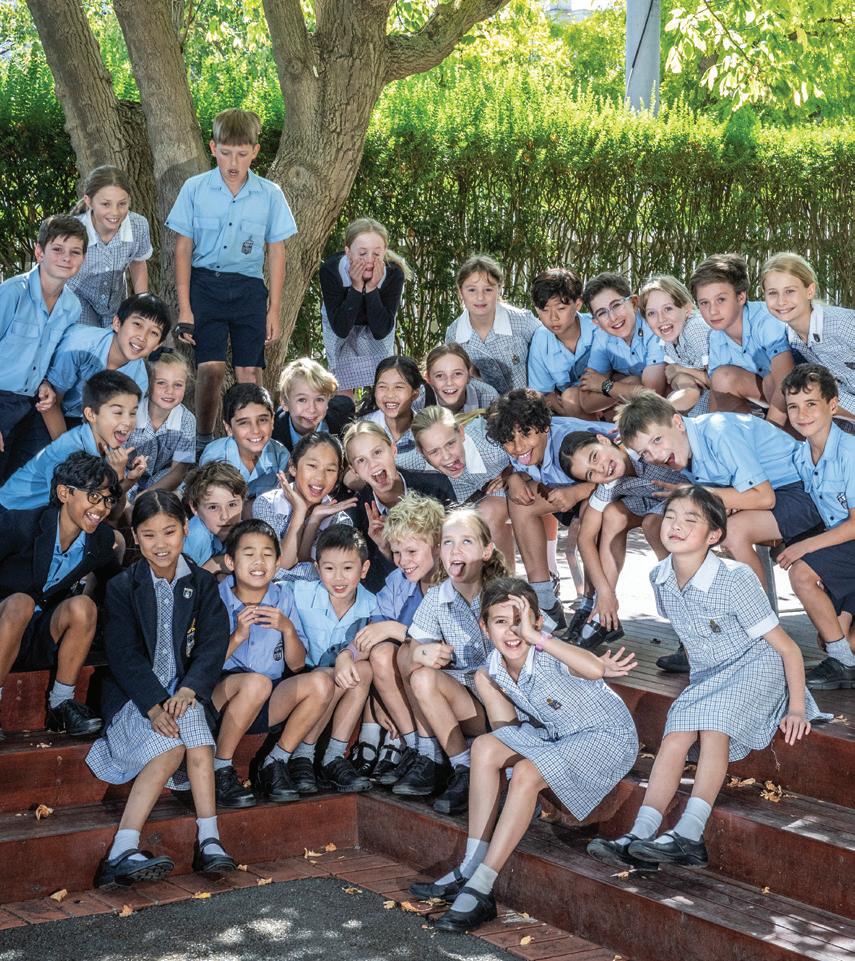
You can read more about student leadership at Melbourne Grammar School on pages 17 – 19.
2 Melbourne Grammar School



Grammar News No. 147 - April 2024 3
Contents 04 From the Chair of Council 05 From the Headmaster 34 The Old Melburnians 39 Obituaries 40 Featured artwork ARTICLES 10 A lifetime of nature's work recognised 11 Australia Day Honours 12 Sport shorts 13 A reflection from our 2023 Academic Head of School 14 Class of 2023 results and destinations 16 Consistent success in Physical Education 20 A legacy created through honour 30 A transformation to strengthen Outdoor Education 32 A glimpse into American basketball culture 33 Nurturing friendships at Grimwade House 35 Introducing The Old Melburnians Council + upcoming events 36 Old Melburnian reunions 38 A Chaplain with a focus on inclusivity 06 Old Melburnian innovators and entrepreneurs 06 Preparing for the electric revolution 08 Redefining volunteering in a digital age 17 Student leadership 17 We are all part of the Melbourne Grammar ‘puzzle’ 18 Building authentic leaders from the onset 19 Meet the 2024 School Captains 22 50th anniversary of the Quad Play 22 Step behind the scenes of the 2024 Quad Play 26 Celebrating 50 years of the Quad Play 28 A father-son history with the Quad Play
Edition 147, April 2024

Philanthropy has been a part of Melbourne Grammar School’s history since before the School opened its doors. Today, the environment that inspires our students and teachers is still shaped by the generosity of our donors who have believed in the education offered by the School for more than 165 years.
Most members of our community recognise that School fees do not cover the full cost of the School’s programs. They appreciate that current students enjoy a curriculum and facilities which reflects the benefaction of those who have come before them.
The School Council – in addition to overseeing general expenditure – works to ensure that we have enough funds available to us to withstand unforeseen circumstances and economic turndowns, as well as support major projects. For these reasons, some years ago, the School established a Future Fund which has been largely built through donations –principally, gifts in Wills.
Adding to a history of generosity
The Future Fund is managed by the School’s Investment Committee. We aim to generate CPI plus 4% interest each year. We maintain the capital value of the Fund but normally distribute earnings towards, as indicated above, specific major projects such as, in recent times, the building of the Geoff Handbury Science and Technology Hub.
A Fund distribution was also vital to maintaining our programs when the School Council reduced School fees during the pandemic. It was due to this that we were one of the few schools who were able to continue to employ our full staff cohort without tapping into the JobKeeper subsidy scheme, and this means we are not now experiencing the significant staff shortages seen at so many other schools across the State.
We are always grateful to those people who make a gift to the School. Some people are fortunate enough to be able to make a contribution when their children or grandchildren are attending the School. For others, including a gift to the School in their Will is their preferred option and, for many, choose to ensure that the impact of their gift has an ongoing benefit by directing their gift into our Future Fund.
My own mother is one such benefactor who, while she could not make a significant contribution to the School during her lifetime, chose to express her huge satisfaction with Melbourne Grammar in this way. In her Will, she recognised the fine education of her three sons, grandchildren, and other family members.
I was fascinated to recently learn that our very first bequest came from a School Council member, Mr George Rusden (1819 – 1903). Mr Rusden played a prominent role in the founding of Melbourne Grammar, going on to serve on the School Council during the last five years of his life. He then bequeathed his home, Cotmandene, to the School which was first used as a residence for senior boarders, and later sold. The funds from this sale were used to form an earlier version of today’s Melbourne Grammar Future Fund.
We are still benefitting from Mr Rusden’s support, as we continue to draw on the interest generated from this donation.
If you are someone who is considering including a gift in your Will to the School, I would like to emphasise the care that is taken to manage these contributions. All funds have specific criteria governing their use, overseen and signed off by the School Council.
With all this in mind, I have now chosen to follow my mother’s example by joining the Witherby Tower Society, the special group of community members who have advised the School of their intention to leave a gift in their Will. I encourage others to join me in becoming part of a long history of philanthropy that will continue to guide the trajectory of Melbourne Grammar.
Andrew Michelmore AO Chair of Council
Melbourne Grammar School 4 FROM THE SCHOOL COUNCIL
Andrew Michelmore AO
The importance of art in our culture
Astrong commitment to the Visual Arts goes hand in hand with a civilised community.
Through art we can see the world through the lens of others, gaining new perspectives and ideas. We can develop a deeper understanding of shape, colour and form. Art can be confronting and challenging. It makes us feel, empathise and think. Moreover, through art, we celebrate the unique capacity of humans to be creative.
Some of the most barbaric human acts have occurred at times and in countries where freedom of expression and artistic endeavour was or is denied, let alone celebrated or encouraged. We think of Hitler’s campaign to purge modern art – which he deemed to be “degenerate” – from Germany’s culture during his reign over unspeakable genocide. Hitler is not alone. We also think of Pol Pot in Cambodia, the Taliban in Afghanistan, ISIS and, even now in 2024, the many countries that censor art and artists.
Contrast that with the ways in which our culture has benefited from the vibrancy and storytelling inherent within Australian Indigenous art, which stretches back more than 60,000 years.
Humankind is so much richer due to the artworks created in Ancient Rome, throughout the Renaissance, during the Impressionist and Cubist art movements, through to the contemporary art we enjoy today.
Design also has an impact on our engagement with the artistic form. Look at the familiar objects that are now classics. This might be an Alessi kettle, mid-20th century Danish furniture, the VW Beetle or a Hermès handbag.
Consider some great and famous cities of the world such as Florence, Paris, New York, London, Barcelona, Los Angeles, Shanghai, Cairo, Rome, and Melbourne. The great Art galleries, museums, gardens, public spaces and buildings in these cities have all been built and designed with great artistic merit coming before anything else including, in most cases, budget.
To be a great artist requires bravery. You cannot replicate what others think or tell you, although Andy Warhol became famous for challenging the notion of mass-produced art. Sometimes bravery will not be repaid for many years to come. Vincent Van Gogh died heartbroken, penniless and unaware of the recognition he would receive. Jan Utzon, the designer of the Sydney Opera House was sacked, left Australia before the Sydney Opera House was completed and never returned to see his work before he died.
Despite the sadness in the personal lives of Van Gogh and Utzon, they have left the world in a better place for their great works of art.
Designers of great works of public art have to be brave for they receive adoration and criticism; think of the modern Cubes in front of the Louvre in Paris, Barcelona’s Sagrada Familia or the recently opened $2.3 billion Sphere in Las Vegas. Closer to home we have Federation Square, the ‘Yellow Peril’ as well as the ‘matchsticks’, ‘egg’ and ‘rib cage’ on City Link. At Melbourne Grammar in 2023 we unveiled the third addition to our Sculpture Walk – Lisa Roet’s Ape Right Hand
 Philip Grutzner
Philip Grutzner
Many of our great artists have had to leave Australia to seek further study, recognition and reward. This includes Sydney Nolan and Fred Williams. We feel proud that just like our sporting stars, businesspeople, and entrepreneurs, Australia can mix it amongst the world’s best in the field of Visual Arts.
We celebrate those students who pursue careers in the Arts. We recognise that it can be difficult to make a decent living from art, but many do. We know that for every Picasso, there are many who never make it, but I encourage our students to follow their passion.
For those who do not follow an artistic career, I trust that, through their Melbourne Grammar education, they will continue to appreciate the beauty and everyday value of art and bring an artist’s perspective in their lives as parents, partners and in their careers and community work.
Philip Grutzner Headmaster
Grammar News No. 147 - April 2024 5 FROM THE HEADMASTER
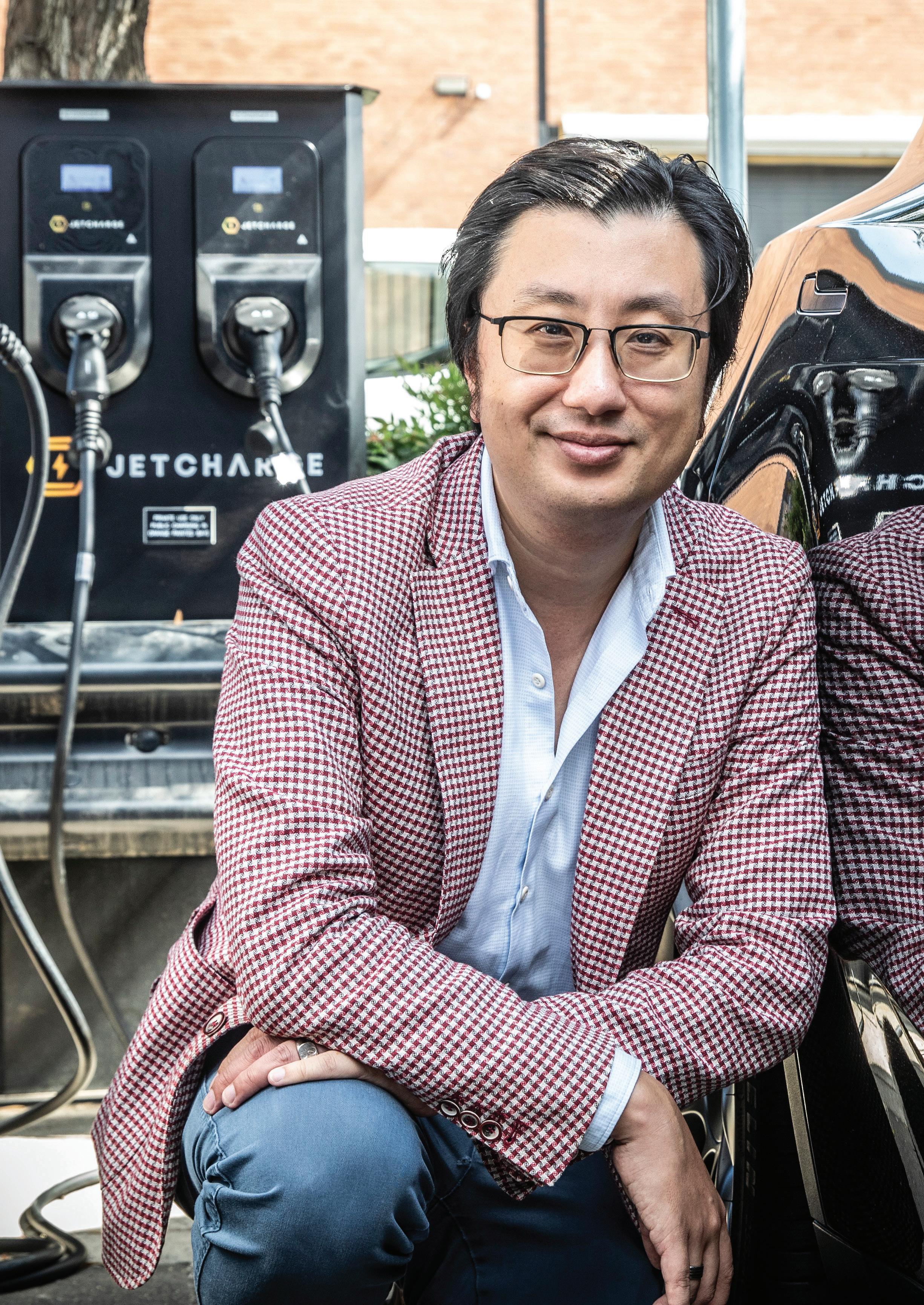
6 Melbourne Grammar School
Preparing for the electric revolution
Melbourne Grammar always gave me the opportunity to do things that were outside my comfort zone and set me up to be courageous in my business life.
For over a decade now, Tim Washington (OM 2001) has been truly ahead of his time.
In 2012, when electric vehicles (EVs) were extremely rare in Australia, Tim was working on the foundations of JET Charge – a company that would be ready for a seismic shift in the way we travel from A to B.
“My goal has always been to identify a problem, then solve it before people even realise it exists,” Tim says. “That’s the basis for our entire business model.”
A LONG-TERM LEAP OF FAITH
Tim’s career began in an entirely different area – corporate law – before he stepped in to help with his family’s clothing manufacturing business. When it came time for Tim’s parents to retire, the family made the decision to shut down their business. “I was faced with a choice,” Tim says. “I could either go back to being a lawyer, or I could invest in something I truly wanted to do.”

A self-described “geek” and with a natural interest in cars, Tim started looking into a relatively new mode of transport – EVs. “I started to consider how these things would be charged and the obvious answer was at home,” he explains. “What I didn’t realise at the time was just how disruptive that was going to be to the ‘petrol station’ model, because all of a sudden, everyone would be capable of fuelling their own vehicle. I thought this might be the opportunity we were looking for.”
As it turned out, JET Charge’s goal to create a specialised installation service for EV charging stations was groundbreaking. “It was initially hard to get the business off the ground,” Tim explains. “We survived off my wife Ellen’s wage and put all our own savings into it. It was a leap of faith for almost a decade.”
FOCUSING ON THE “NET GOOD”
In 2024, Australia’s Electric Vehicles Council estimates there are around 140,000 pure EVs on our roads, accounting for about 8% of all new vehicles sold. Having correctly predicted the rise in EV use, JET Charge is now the largest EV charging infrastructure provider in Australia and is about to go out for its biggest funding round to create a new “charging-as-a-service” model, ready for what Tim expects to be an “onslaught” of EV use from 2025.
“If we were going to take this risk, Ellen wanted us to do something that produced a net good, something we could be proud of,” Tim says. “I believe we’re working on a oncein-several-generations change in terms of how we travel, and how we consume energy. To be at the forefront of that, leading the country down this path, is incredibly fulfilling.”
“Melbourne Grammar always gave me the opportunity to do things that were outside my comfort zone and set me up to be courageous in my business life,” says Tim, who is keen for his two young sons to follow in his footsteps by attending Melbourne Grammar. “Doing hard things is hard. Doing hard things will bring deniers, will bring doubters, will bring detractors, but it's also what moves the needle. So, despite things being hard, we'll just keep turning up every day.”
7
INNOVATION AND ENTEPRENUERSHIP Grammar News No. 147 - April 2024
Redefining volunteering in a digital age
Self-confessed “serial volunteer” Tanya Dontas (OM 2007) understands the positive impact that comes with giving back, as well as the challenges volunteers and not for profit organisations can face.
In 2016, the social impact specialist and entrepreneur co-founded Vollie, an online volunteering marketplace connecting people with causes that matter to them – but with a few significant differences from the traditional model.
A NEW APPROACH TO VOLUNTEERING
“In speaking with people at not-forprofits we found they often had a long list of people to undertake simple hands-on tasks, but they were under resourced from a skills perspective. That was really a starting point for us,” explains Tanya.
Somewhat uniquely, Vollie addresses the physical barriers to volunteering by employing a remote working model.
“As soon as we removed that barrier, it was amazing to see the uptake by skilled workers such as marketers, legal professionals and accountants,” says Tanya.

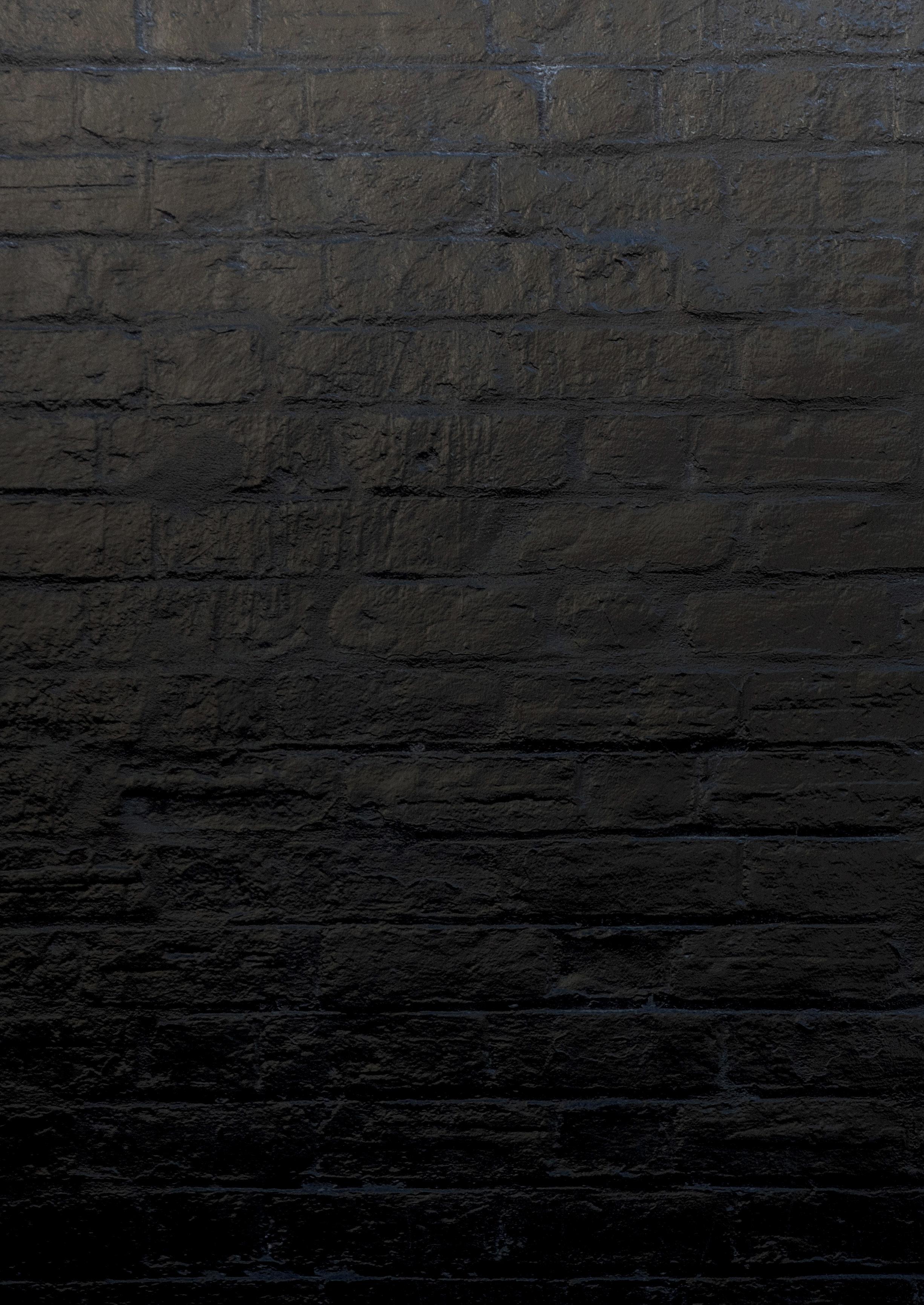
8 Melbourne Grammar School

The values that I learned at Grimwade have stuck with me for life and are part of the person I am today.
Tanya Dontas (OM 2007)
“We also recognised that people can find it hard to commit to continuing volunteer work so all the projects on Vollie are project based. They are specific tasks with a clear start and end date,” she explains. “This has instantly eliminated issues.”
Vollie is currently utilised by more than 1300 non-profit, charity and social enterprises. They post their projects using simple templates, and manage the engagement process and work using an inbuilt feedback loop.
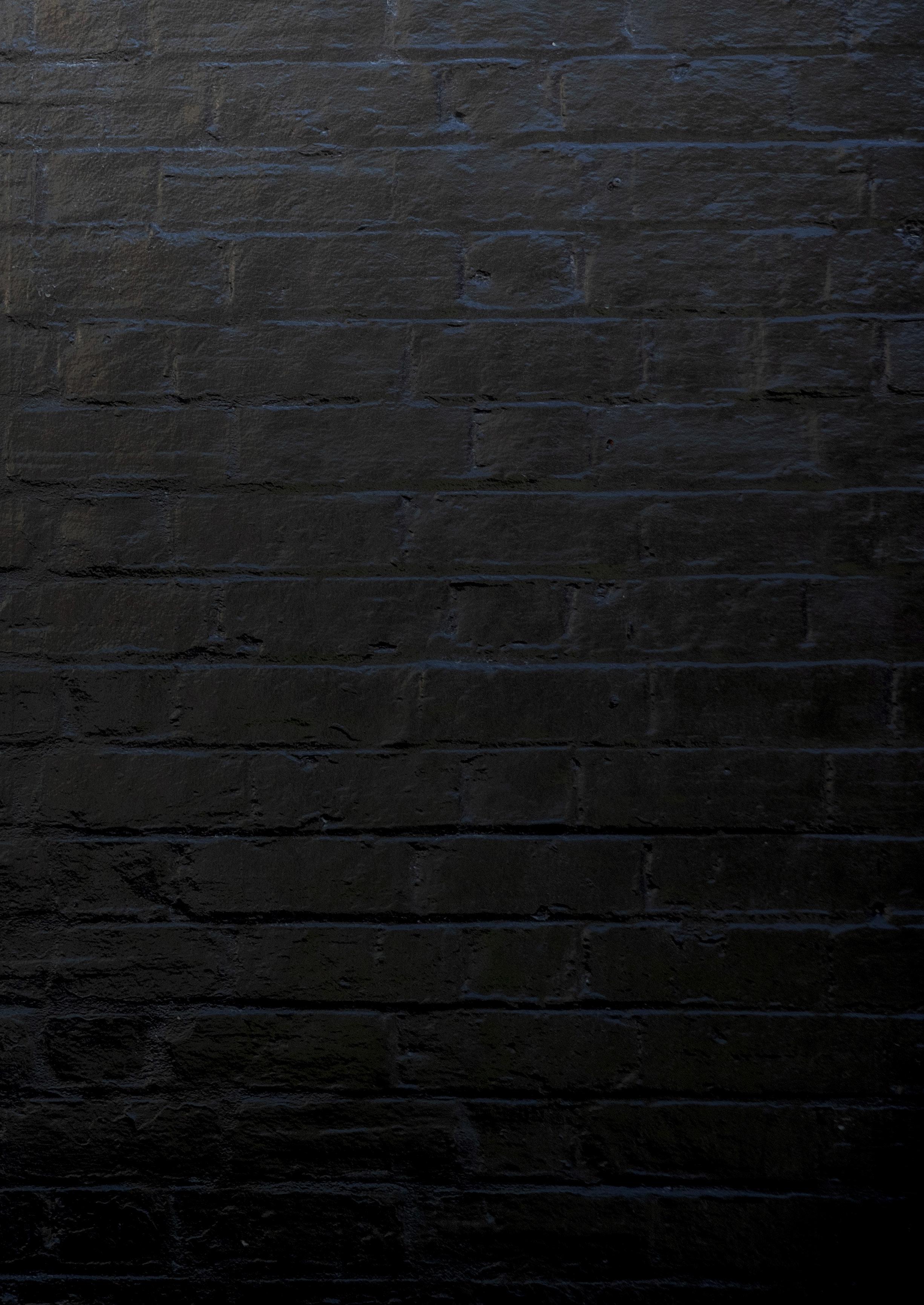
“It didn’t feel right to take money from a charity so these groups use Vollie for free,” Tanya says. “However, we had to make the platform financially sustainable so now universities and corporate workplaces can utilise the platform, but they pay for the service.”
In addition to time poor but community driven workers, Vollie is also popular with university students looking to get real world experience and improve their resume as well as, increasingly, retirees.
“Vollie is also popular with legal firms with a commitment to pro bono work and major companies with staff volunteer programs,” says Tanya. “The system has a tracking system which not only records the projects and hours completed, but also the dollar value of that work and impact, helping these companies report on their social contribution.”
At the time of publication, Vollie has delivered around 7,500 projects, about half a million volunteer hours, and approximately $9 million in project value add.
DRIVEN BY VALUES LEARNT AS A CHILD
Juggling a busy work schedule and raising a toddler, Tanya still prioritises giving back by mentoring other startups to help them on their journey. This drive to give others a leg up is inspired by Tanya’s upbringing. “Coming from an immigrant family, I think it does change your view of the world,” she says. “When my parents came to Australia, they worked very hard. I am lucky to have the resources and the education I've been given – I'm very aware that not everyone gets the same chances.”
Holding fond memories of her time at Grimwade House, Tanya is excited for her daughter to follow in her footsteps by attending the school in a few years. “It’s amazing that she will go to the same school and be in the same House my brother and I were in,” says Tanya. “The values that I learned at Grimwade have stuck with me for life and are part of the person I am today.”
You can find out more about Vollie at vollie.com.au
9 Grammar News No. 147 - April 2024
A lifetime of nature's work recognised
Botanist, geologist, educationalist and conservationist, Leon Costermans OAM (OM 1950) has dedicated his life to educating generations of Victorians about our natural environment. And his passion for the exploration and preservation of our bushlands began very early.
Leon grew up in East Kew before it was fully urbanised, and the Yarra River was his playground. “In those days, around the start of WWII, kids went off and did their own thing,” says Leon. “I loved to explore along the river, Studley Park and areas like that – I felt perfectly at home in the bush.”
INFORMATIVE BOOKS FOR THE NON-SPECIALIST
Leon’s love of the outdoors was fostered as a Scout, and also by his mother, who was a member of the Field Naturalists Club of Victoria. “She taught me about the bush and how to draw it, so I got that sketching gene from her,” he says.
Illustrations of plant life are included in Leon’s Trees of Victoria book, which was first published in 1966 and has been reprinted an incredible 23 times. Now widely recognised as the standard introduction to the Victorian bush, the book came about because Leon identified a need.
In addition to working as a teacher, Leon was responsible for training adult Scout Leaders in the 1960s – 70s. “One of the requirements in the Scout Test activity program was to be able to identify a certain number of trees. I thought we needed to know about our own (Australian) trees, rather than English ones, but I discovered that very few people knew much about Australian trees, and there were not many publications suitable for nonspecialists from which they could learn.”
“Writing that book sort of branded me as an expert, which I wasn't, I was just self-taught,” says Leon. “But once I produced the book, I just kept going, and that turned into Trees of Victoria and Adjoining Areas (1994).” His much larger book, Native Trees and Shrubs of South-eastern Australia, was published in 1981 and is still in print.
Leon’s latest book, Stories beneath our feet: exploring the geology and landscapes of Victoria and surrounds, was published in 2022. Based largely on Leon’s field experience, the 672page book took 17 years to write. Aimed at non-geologists, it explains the geological origins of southeastern Australia and the influence of geographical character on vegetation.
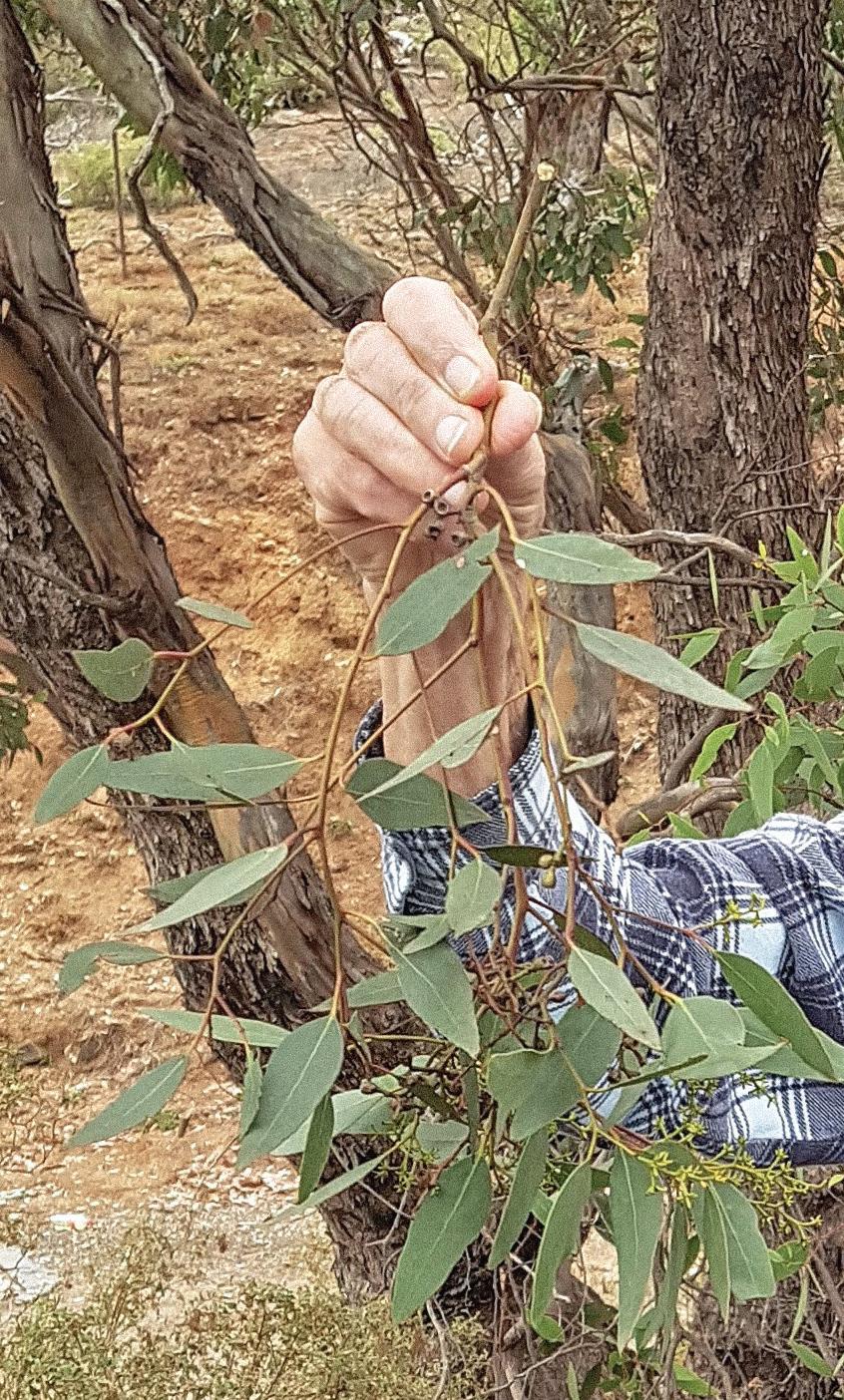
MEDAL OF THE ORDER OF AUSTRALIA
In January 2024, Leon was awarded a Medal of the Order of Australia ‘for service to conservation and the environment’ through the Australia Day Honours program.
“I was mainly pleased to see that work in the natural environment was recognised, particularly as another environmental friend on the Mornington Peninsula received the same award in that list,” says Leon about the OAM.
“There are thousands of volunteers quietly working away in natural reserves without any publicity.”
Melbourne Grammar School 10 SUCCESS AND ACHIEVEMENT
Australia Day Honours

SUPPORTING THE COMMUNITY
Now 90, Leon continues to advise and support as well as give talks and tours to community groups and others. He principally works with the Friends of Langwarrin Flora and Fauna Reserve, a group which he co-founded 36 years ago.
“There are three main reasons we do it,” says Leon. “We enjoy working in the outdoors, working with others, and working to achieve something worthwhile, which is aiming to restore the reserve to its most natural state so that anyone can appreciate its value and remarkable biodiversity.”
Melbourne Grammar School congratulates all members of our community recognised through the 2024 Australia Day Honours. These include:
MEMBER OF THE ORDER OF AUSTRALIA (AM)
Mrs (Penelope) Penny Fowler (Past Parent)
For significant service to the community through a range of organisations.
Dr Ian Hardingham (OM 1962)
For significant service to the law and legal reform in Victoria.
Mr (Geoffrey) Geoff Hone (OM 1962)
For significant service to the legal profession, and to charitable and educational foundations.
Emeritus Professor Adrian Polglase (Past Parent)
For significant service to medicine as a surgeon, researcher and educator.
Ms Wendy Wilmoth (Past Parent)
For significant service to the judiciary, and to the law.
MEDAL OF THE ORDER OF AUSTRALIA (OAM)
Mrs (Mary) Kaye Blackburn (Past parent)
For service to the community of Ararat.
Mr Leon Costermans (OM 1950)
For service to conservation and the environment.
Mr Peter Levi (OM 1971)
For service to business, and to the community.
Mr Arne Rubinstein (OM 1981)
For service to youth.
Mr (Gerald) Gerry Tucker (OM 1967)
For service to swimming.
11 Grammar News No. 147 - April 2024
Sport shorts
Melbourne Grammar School senior students and young Old Melburnians have recently enjoyed success in a variety of sports. Here are some highlights.*
ROWING
Congratulations to four Old Melburnians on their selection into the 2024 Australian Olympic rowing team. Jess Morrison OAM (OM 2010) will compete in the Women’s Coxless Pair. Fergus Hamilton (OM 2017), Tim Masters (OM 2009), Jack Robertson (OM 2016) will compete in the Men’s Coxless Four.
Jess was also a member of the Victorian Women’s Eight crew who placed first in the Interstate event at the 2024 Australian Rowing Championship, winning the Queen’s Cup. Similarly, Fergus, Jack and Tim were members of the triumphant Victorian Men’s Eight crew who won the King’s Cup.
James Houghton (OM 2022) and Winston Hooper (OM 2022) raced in the Interstate Men’s Youth Eight event (with Nick Adkins (OM 2022) as a reserve), placing third at the same regatta.
Nixon Murray (OM 2023) and Seb Whiteley (OM 2023) are set to pursue their tertiary studies in the US this year, having both secured athletic scholarships due to their outstanding rowing abilities. Nixon will attend Boston University, while Seb will study at Princeton University.
CRICKET
Harry Dixon (OM 2022) was an opening batsman for the Australian team who won the ICC U19 Cricket World Cup in February 2024. Sixteen counties vied for this honour. The Australian team were undefeated throughout the tournament. Harry was consistently impressive, scoring the overall third highest number of runs across the competition. This is the first time Australia has won the Cup since 2010, when Alex Keath (OM 2010) was a member of the team. Harry signed a two-year contract with Big Bash team, Melbourne Renegades, in late 2023.
AFL
Ryley Sanders (OM 2023) has commenced his AFL football career, playing for the Western Bulldogs after being selected by the club in the national draft last year. Charlie Edwards (OM 2023) was drafted by the Adelaide Crows and we look forward to his on-field debut soon.
BASKETBALL
Jack Whitbourn (OM 2023) was a member of the Victorian team who won the Australian Basketball U20 National Championships in February 2024. Victoria had a perfect tournament remaining undefeated throughout the event. Most recently, Jack was a member of the Australian team that won the 2024 Albert Schweitzer Tournament held in Germany. Based on his basketball prowess, he has secured a scholarship at the University of California, Riverside where he will commence studying this year.
WATERPOLO
Year 12 student Daniel Magasanik was named Most Valuable Player (MVP) at the 18&U Australian Youth Water Polo Championships held in January 2024. Along with Nicholas Mordes (OM 2023), Daniel is a member of Water Polo Australia’s 18&U high-performance program which develops elite athletes for possible future senior Australian representation. They are both also members of the Australian U18 squad and will vie for a place in the Australian team competing in the Men’s U18 Water Polo Championships to be held in Argentina later this year.
2024 School Team success
The following First teams secured top three places in summer sporting competitions this year:
Premiers – Touch Football**
Second place – Cricket, Tennis
Third place – Rowing (Head of the River)
2023 School Team success
The following First teams secured top three places in sporting competitions last year:
Premiers – Futsal, Hockey, Snowsports, Water Polo
Second place – Soccer, Touch Third place – Athletics, Swimming
HOCKEY
Byron Fernandes (OM 2021), Ollie Will (OM 2023) and Year 12 student Duncan Jackson represented Victoria at the 2024 Hockey Australia Men’s U21 Hockey Championships, with the team placing second in the tournament. Ollie and Duncan continue to be members of the Hockey Australia Men’s Futures Squad which recognises the elite hockey cohort that will reach their ‘prime’ playing age when the Brisbane 2032 Olympic Games are staged.
SNOWSPORTS
Year 12 student Max Kelly was a member of Australia’s Winter Youth Olympic Team which competed in the Youth Olympic Games at Gangwon in January 2024. Max was Australia’s top performer in Alpine Skiing, placing 22nd in the Men’s Slalom.
* Correct as at 9 April 2024
** First ever premiership for the School at this level in this sport
Melbourne Grammar School 12 SPORT SHORTS
2023 Academic Head of School A reflection from our
The following is an excerpt of a speech delivered by Jaden Taveira, 2023 Academic Head of School, at the 2024 Academic Assembly. The title of Academic Head of School is awarded to the top performing VCE student in the given year.
It is truly a privilege to be able to share with you my reflection upon the lifeblood of our School – a culture of learning which is unashamed in its pursuit of knowledge and wisdom.
I have always believed a holistic education [like one offered by Melbourne Grammar School] – one which seeks to foster the student’s development as a whole person –to be synonymous with boundless opportunity.
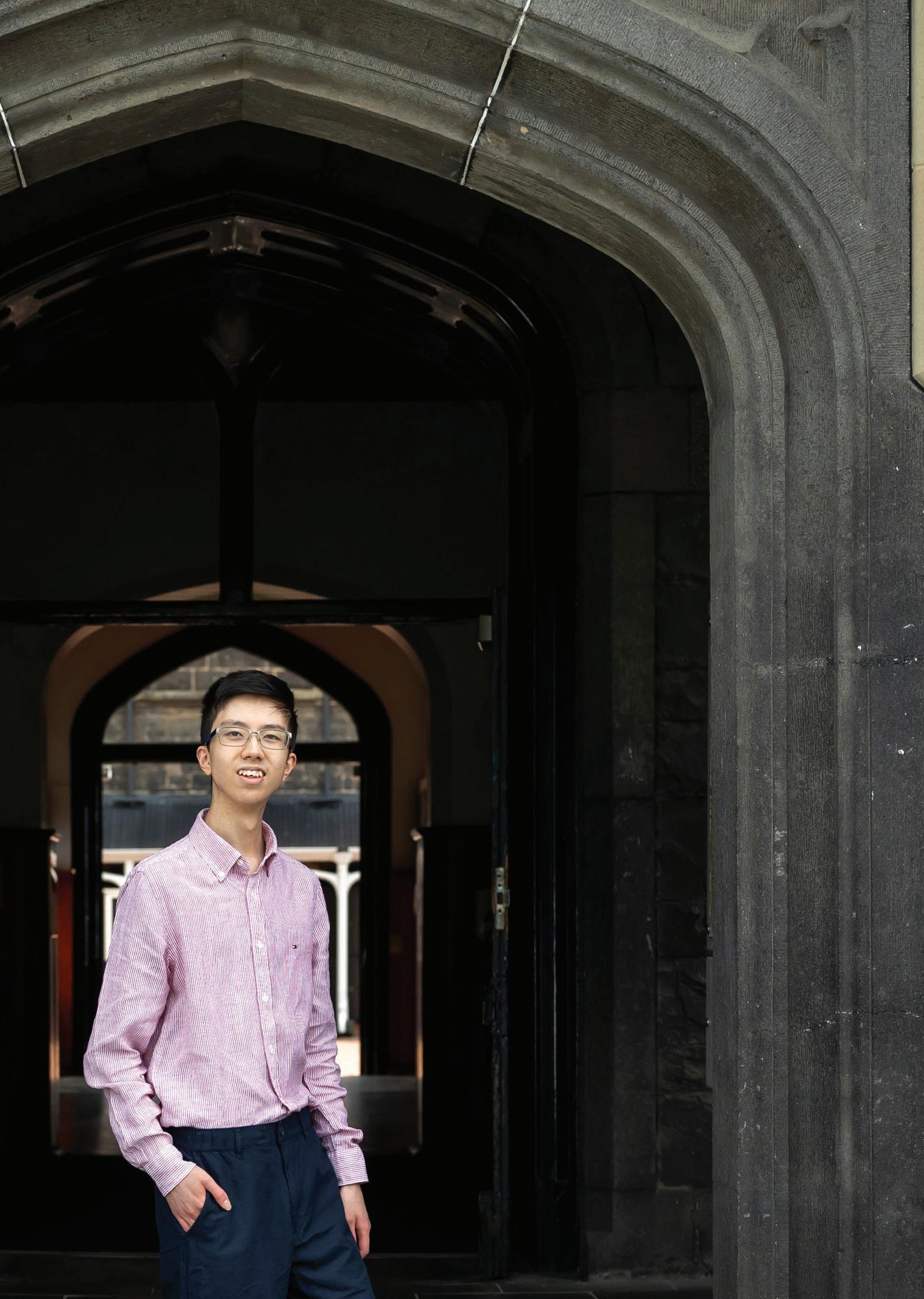
The opportunity to grow in understanding of the world around us. The opportunity to seek out the very best within us in all that we do. The opportunity to hone valuable skills and behaviours that will abide in adulthood.
…Learning happens bit by bit, day by day. Learning prepares us for the future but, for this, it demands our greatest efforts today, in the present. The successful learner is one who is always engaged with the present learning opportunity, who is prepared to be challenged and to be inquisitive, and who relishes the journey and not merely the result.
…Remember that the purpose of the education provided by this school is not merely to enable you to enter your preferred course at university. In fact, to me, the behaviours you develop over the course of your educational journey are just as important as the actual course content you learn in class, for these are behaviours which are so readily transferable, and which will hold you in good stead in your endeavours beyond the Bluestone. ...Now, more than ever, successful learning demands independent, critical thinking.
…When I look at all the teachers gathered here today to celebrate the achievements of their students, I cannot help but feel so very fortunate to count many of them as mentors throughout my Senior School journey, equal parts font of wisdom and source of inspiration. To the staff, I say a very sincere thank you.
…Everything the School does revolves around enabling you to be confident, lifelong learners. For when you do eventually walk through the Ross Memorial Gates for the last time, the facts, the information you learnt throughout your schooling may fade away... What will remain is far more important; these are the skills and behaviours that will give you the confidence to tackle the challenges which face our ever-changing society.
…I wish you all a year filled with successful and rewarding learning.
About Jaden Taveira
Jaden Taveira (OM 2023) is an exemplary scholar. He achieved the highest possible score of 99.95 in Year 12 and was awarded Prizes in English Literature, French and Latin. During his time in the Senior School, he was an active member of the Chapel Choir and Ross House, receiving Colours for both.
A scholarship recipient, Jaden was supported by the RWA Alcorn Bequest.
Jaden is currently studying a Bachelor of Biomedicine at the University of Melbourne. His future aspiration is to pursue a Doctor of Medicine at the university.
2024 RESULTS AND DESTINATIONS
Class of 2023 results and destinations
Congratulations to the Class of 2023 on their exceptional VCE results, continuing Melbourne Grammar School’s legacy of academic excellence.
We celebrate Jaden Taveira (2023 Academic Head of School), Jerry Hui (2023 Proxime Accessit) and Alex Gao who all attained the highest possible ATAR of 99.95, three of only 39 across Victoria.
Ter t iary des t ina t ions
Further, we recognise and value all students who have been steadfast in their learning, and who have attained their own personal best ATAR.
Virtually all students pursuing tertiary education received an offer at a Victorian provider, with some choosing to attend an interstate or international university instead. The areas of study are as diverse as the cohort themselves.
You can find more information about 2023 VCE results on the School website.
Offers at Victorian universities
Australian Catholic University
Catholic University
Deakin University
La Trobe University
Deakin University La Trobe University Monash University
Monash University
RMIT University
RMIT University
Swinburne University
The University of Melbourne
University
The University of Melbourne
Victoria University
1 Double degrees may be represented in more than one field
2 Includes Arts and Law
Melbourne Grammar School 14
of study
1 Agriculture, Environmental
related studies Architecture and Building Creative Arts Education Engineering and related technologies Health, Medicine and related Information Technology Management and Commerce Natural and Physical Sciences Society and Culture 2 0 20 40 60 80 0 20 40 60 80 Agriculture, Environmental and related studies
and Building Creative Arts Education Engineering and related technologies
Medicine and related * Information Technology
and Commerce
Physical Sciences
and Culture **
Fields
at Victorian universities
and
Architecture
Health,
Management
Natural and
Society
0 20 40 60 80 100 Australian
Swinburne
0 20 40 60 80 100
Victoria University
2024 RESULTS AND DESTINATIONS
VCE Outcomes
ATAR outcomes
99+
14% of our students achieved an ATAR of 99+, placing them in the top 1% of the State.
95+
35% of our students achieved an ATAR of 95+, placing them in the top 5% of the State.
90+
55% of our students achieved an ATAR of 90+, placing them in the top 10% of the State.
Study score outcomes
50
Fifteen students achieved the maximum score of 50 in at least one subject in 2023. The subjects were:
• Biology
• Chemistry
• English (2 students)
• English as an Additional Language
• General Mathematics
• Geography
• History: Revolutions
45+
8.1% of all study scores were graded as 45+, placing those students in the top 1% of their subjects.
• Legal Studies
• Mathematical Methods (2 students)
• Philosophy (2 students)
• Physical Education (4 students)
• Physics
40+
27.1% of all study (subject) scores were graded as 40+, placing those students in the top 8% of their subjects.
2023 results
* The Distribution of 2023 Letter Grades graph compares Melbourne Grammar School’s 2023 results with our school sector (schools with similar characteristics) and those of Victoria as a whole.
Grammar News No. 147 - April 2024 15
School
Sector State
A+ A B+ B C+ C D+ D E+ E UG NA
Melbourne Grammar
School
Distribution of 2023 Letter Grades *
M e lb o u r n e G r a m ma r S ch o o l S ch o o l Se c to r St a te % A+ A B+ B C+ C D+ D E+ E NA UG 0 5 10 15 20 25 30 30 25 20 15 10 5 0 %
Consistent success in Physical Education
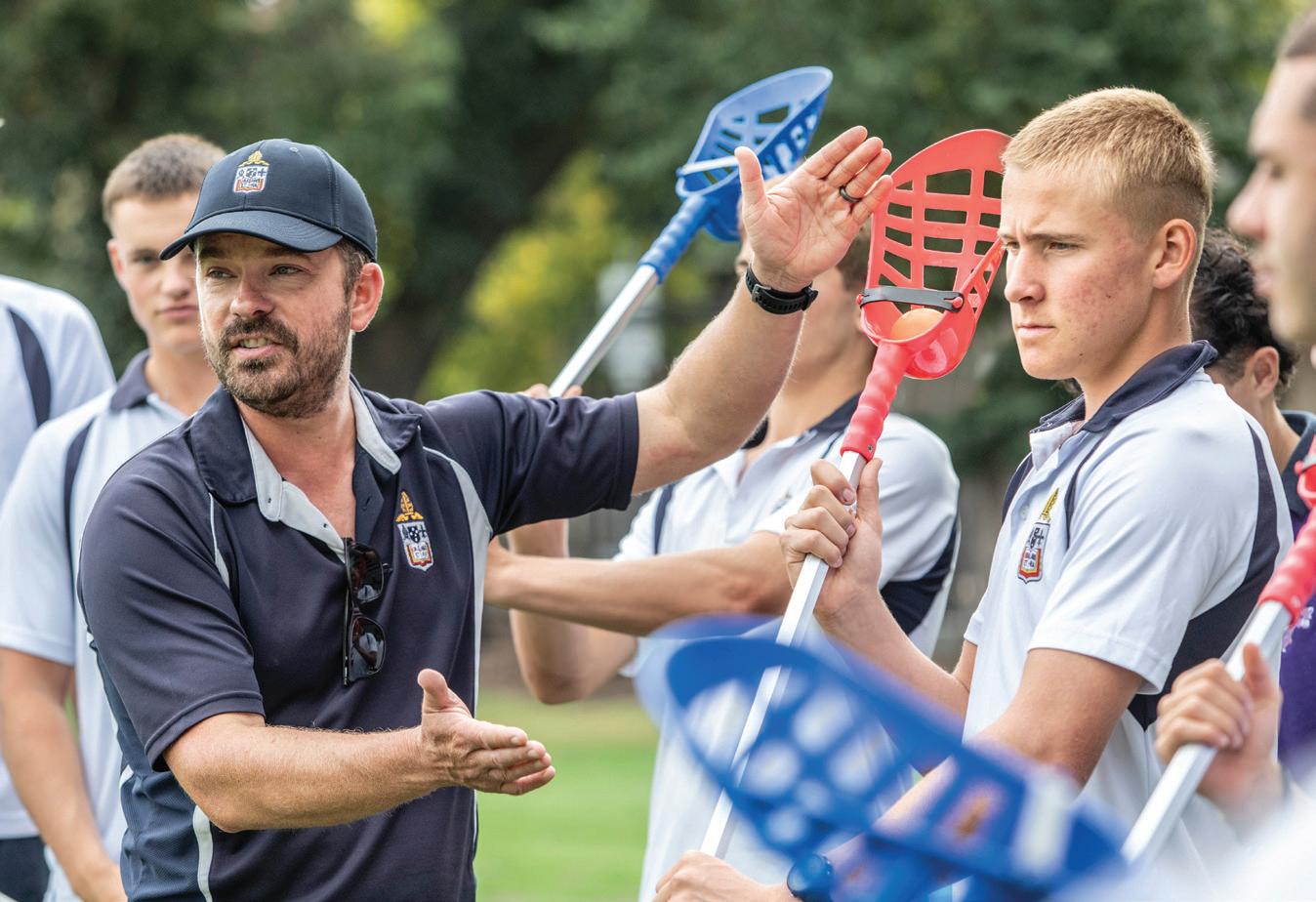
Melbourne Grammar School holds an outstanding track record of students excelling in VCE Physical Education Units 3 & 4.
Last year, around 10,000 students across Victoria studied the subject. Of these, 23 achieved a perfect study score of 50. Four were from Melbourne Grammar.
Indeed, Melbourne Grammar students have achieved exceptional results in the subject over a number of years. In 2020 and 2022, Melbourne Grammar students were awarded a Premier’s VCE Award which places them at, or very near, the top in Victoria. (Premier’s VCE Awards for 2023 results are yet to be announced.)
Evan Coventry, Head of Health and Physical Education at the Senior School, says these results are the culmination of hard work and passion. “We’re extremely fortunate to have, for the most part, students who want to engage and want to learn. We build on this by exploring areas of interest to them, even if it is not directly related to the VCE curriculum. We find if you give students that little bit back and make it more personal for them, it comes back in spades in terms of the effort that they put in, and the growth that they show.”
“And while we're very proud of those perfect scores, we’re equally proud of those students who achieve their personal best, whatever that may be,” he says. “We have exceptional staff who work with our students to be independent and creative thinkers. They work to achieve excellence, but that doesn’t mean a student needs to be the best in the class, or the best in the state – it’s about the individual’s best, whatever that may be for them.”
SCIENCE BASED APPROACH
DRAWS A DIVERSE ARRAY OF STUDENTS
VCE Physical Education is highly science-based according to Evan. “Most science subjects have both theoretical and practical components. VCE Physical Education has a mix of biology, psychology, and sociology within it, with the application of that theory focusing mainly on physical activity and sport.”
Due to the diverse range of topics in the subject, the students who select VCE Physical Education Units 3 & 4 do so for different reasons. “We have a range of students, from those who really love being physically active and have a passion for sport, to those who are not very sporty but enjoy learning about how the human body works,” he explains.
LESSONS BEYOND THE SCHOOL GROUNDS
“We have amazing, experienced Health and Physical Education teachers across the School who provide a positive environment where students want to ask questions and want to learn, creating an interest in the subject,” says Evan.
“And part of our job is to not just have students active during Physical Education classes, but to teach them how to be active for life,” he says. “We want them to know how they can work physical activity into their daily routines, for their health and wellbeing and all of the things that contribute to living a long, happy life.”
Melbourne Grammar School 16 2024 RESULTS AND DESTINATIONS
are all part of the
Melbourne Grammar ‘puzzle’ We
Like the pieces of a puzzle, we all fit in. And yet, we are all unique. We cherish individual identity and honour the shape and purpose of the bigger picture. We also come to learn and love the living paradox of Melbourne Grammar School; it is and is not the same puzzle that it was in the past.
In a school of over 1500 distinct pieces, which branches into a community of thousands of others – Old Melburnians, friends, families – we move from place to place, from link to link, from puzzle piece to puzzle piece. And although our location at any given time may vary, one aspect never falters: our contribution to the other pieces around us and their contribution to us.
This contribution is the essence of a Melbourne Grammar education – mutual beneficence where one’s strengths complement another’s limitations.
Every time a student wears their navy-blue blazer, proudly displaying our school motto, ‘Ora Et Labora’, the rule of St Benedict, they are part of something bigger. Every time a student sings the traditional School Hymn, they are part of something bigger. Every time a student walks through a School gate in the morning, they are part of something bigger. Regardless of the shape, colour or orientation of their puzzle piece, they are all in accord.
Whether you score a flurry of boundaries on the turf, create eye captivating blind contour drawings, or excel in your subjects academically, you are a puzzle piece. Whether your saxophone’s jazz standards resonate in The Old Melburnians War Memorial Hall, Wadhurst Hall or Valder Hall, all steeped in history, or take a mark in the Cordner Eggleston Cup, or participate in Walk for Women, Crop-a-Kid, Clean Up Australia, or our i-CARE program, you are a puzzle piece. Whether a family member supporting the journey, a teacher that shares invaluable lessons, or even you, reading this article now, you are an invaluable piece of this Melbourne Grammar puzzle.
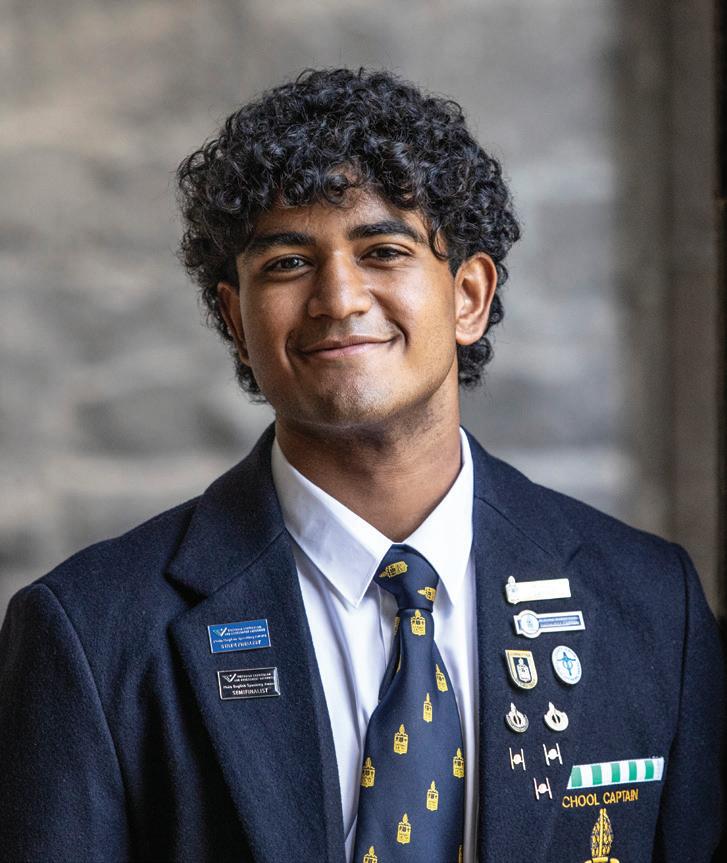
Hirunaka Ekanayake
When we come together – each with our respective purpose – we create something that is truly ‘puzzling’. Such a seemingly vast community is so deeply interconnected in one form or another. The whole is not merely an addition or sum of the parts; it is a multiplication in being at once both personal and communal.
Hirunaka
Grammar News No. 147 - April 2024 17
Ekanayake Captain of the School
STUDENT LEADERSHIP
An exploration by the 2024 Captain of the School.
Building authentic leaders from the onset
What does leadership mean for students at Melbourne Grammar School? In attempting to answer this question, what comes to my mind is the advice of Dr Martin Luther King Jr, who told us: “Life’s most persistent, urgent question is, ‘What are you doing for others?’”
Inherent in this idea is the belief that anyone can lead because anyone can serve, and I think this sums up the way we understand student leadership across our campuses.
Of course, not every student takes on a formal leadership position, but it is no less important to instil leadership characteristics in students who do not take on these roles. Our aim is to develop young people who are collaborative, certain about their own values, and able to use those values to guide their decision-making. Any student can be invited to develop these skills.
LEADERSHIP INVOLVES RESPECT AND INCLUSION
In some ways, the approach to leadership at Melbourne Grammar is almost the opposite to the traditional view. Here, we value leaders who can move towards a goal by bringing others on the journey, rather than simply dictating what must happen next. We believe that the capacity to ensure multiple viewpoints are heard, listened to, and respected will always result in a better outcome.
Importantly, this style of leadership involves encouraging others to hold and consider alternative and differing views. This is particularly important today when many issues are polarised in our wider community, and there’s little room for healthy, respectful disagreement. The ability to engage in the “messy middle” is vital.
What is fascinating to see is how quickly other students pick up on their need for a leader to be authentic in their role, along with having an ability to work on behalf of everyone around them – not just the students in their immediate circle. From an early age, students have a strong understanding that leaders need to act in the interests of all members of a group.
EVERYONE LEARNS TO LEAD
Instilling these skills means we have to start talking about leadership with our youngest students. Of course, the guidance and level of responsibility we give to our students is age-appropriate, and changes as they mature. Even within a given year, a student’s understanding of leadership may change. This reflects an approach we refer to as the “spiral curriculum” where simple ideas are introduced in earlier years, and are returned to time and time again increasing in sophistication as our students progress through the School.
At Grimwade House, we prompt students to begin exploring how they could use their strengths to work with others. At Wadhurst, emerging adolescents are encouraged to collaborate with their peers and work toward a goal that benefits the wider community. At Senior School, as students move towards adulthood, they are given opportunities to understand the broader responsibilities and obligations that come with being a leader.
Whether students take up a formal leadership position or lead others in a more informal way, ultimately, we want our students to understand who they are – as leaders, and as people. With this knowledge, they will be equipped to tackle whatever difficulties they might encounter, and be able to serve and lead their communities from a confident, positive place.
Ben Hanisch Deputy Headmaster and Head of Senior School
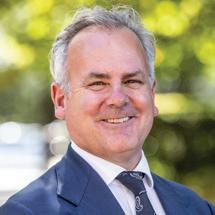
Melbourne Grammar School 18
STUDENT LEADERSHIP
Meet the 2024 School Captains
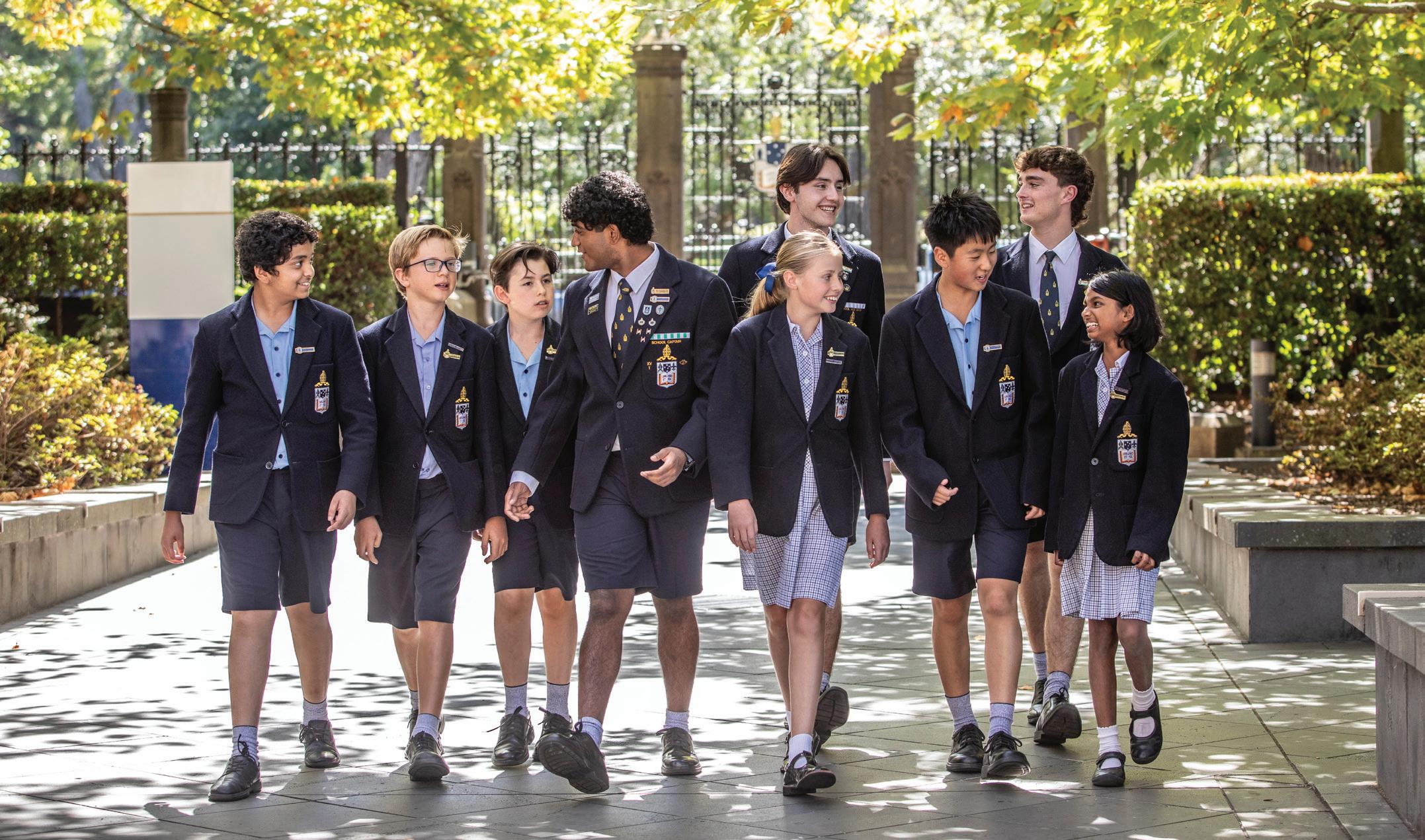
We asked one of our youngest School leaders, Anastasia Elwela, Year 6, about her thoughts on leadership.
Good leadership involves being respectful and giving everyone a voice. That’s very important. It also involves using your initiative. If something needs to be done, just doing it even if you’re not asked to is another sign of a good leader.
It's also really important that you try to make sure that everyone gets an opportunity to have a go in whatever is going on.
It’s good to try something new so helping people do that is part of being a good leader as well.
You don’t have to have an allocated leadership role to be a good leader. Even when you are just working in a group you can try to make sure that everyone’s comfortable and that the job’s getting done. You can try to make it fun so people want to do the work, and they're engaged in what you're all doing.
Most importantly, you have to lead by example. You need to show integrity and you need to think carefully about how other people might be feeling.
I am very proud to be a School leader this year. I am looking forward to working with Grimwade House students and teachers. I hope I can help in a way that makes a difference.
Anastasia Elwela, Year 6

Grammar News No. 147 - April 2024 19
From left: Daivik Bose, Wadhurst Vice-Captain; Finn Reith, Grimwade House Captain (Semester 1); Orlando Yanni, Grimwade House Captain (Semester 2); Hirunaka Ekanayake, Captain of the School; (rear) Ryan Mooney, Vice-Captain of the School; India Peters, Grimwade House Captain (Semester 1); Zack Tung, Wadhurst Captain; Hugh Ryan, Vice-Captain of the School; Anastasia Elwela, Grimwade House Captain (Semester 2)
A legacy created through honour
Harry Dudley (OM 2023) was the recipient of the Ross T Shelmerdine Scholarship during his time as a boarder at Melbourne Grammar School. Here, he reflects on his recent interaction with the Shelmerdine family and the impact the scholarship has had on his life.
It was the morning after my last Year 12 exam that I received a message saying that Lady Southey wanted to personally meet me. It seemed my letter thanking her for her support was greatly appreciated and sparked her curiosity.
Unfortunately, at the last minute, Lady Southey couldn’t make our lunch due to unforeseen circumstances. I did, however, have the great pleasure of meeting her sons, David and Stephen Shelmerdine.
I connected with David over our common interest in agriculture, and learnt he had a farm near Mathoura, only a relatively short distance from my family’s farming property at Deniliquin.
Stephen talked about his father after whom my scholarship was named. One story that I particularly enjoyed listening to was about how Ross thought deeply about the future sustainability of our environment and pastoral land use on a walk from Adelaide to Alice Springs. He was a such visionary thinker.
It will always be a memorable experience for me to have met David and Stephen Shelmerdine. It gave me an opportunity to thank them for their belief in the potential of students like me.
With the support of the Ross T Shelmerdine Scholarship, I have been able to establish strong connections with students who come to Melbourne Grammar from all over Australia, achieve strong academic and co-curricular outcomes, and develop my leadership skills.
As I commence studying a Bachelor of Commerce at the University of Melbourne, I will work to honour the generosity of the family by making the most of the opportunities that follow on from my time at Melbourne Grammar School.
We are privileged to be able to keep this scholarship going.
Lady Marigold Southey
About the Ross T Shelmerdine Scholarship
In 1987, the family of the late Ross Shelmerdine, including his widow Lady Marigold Southey, generously established a scholarship in his memory. The Scholarship enables a country student to attend Melbourne Grammar School as a boarder who, for financial reasons, would otherwise not be able to do so.
Ross Shelmerdine OBE CMG (OM 1937) was a pupil at Melbourne Grammar during the 1930s and his two sons, Stephen Shelmerdine AM (OM 1968) and David Shelmerdine (OM 1970), also attended the School.
Ross was President of the Old Melburnians in 1970. During the 1960s and 70s he devoted much time and energy to fundraising activities at the School including the establishment of the Melbourne Grammar School Foundation.
Melbourne Grammar is extremely grateful to Lady Southey and her family for the wonderful legacy they created and the continuous support of country students, enabling them to board here.
Melbourne Grammar School 20 GIVING
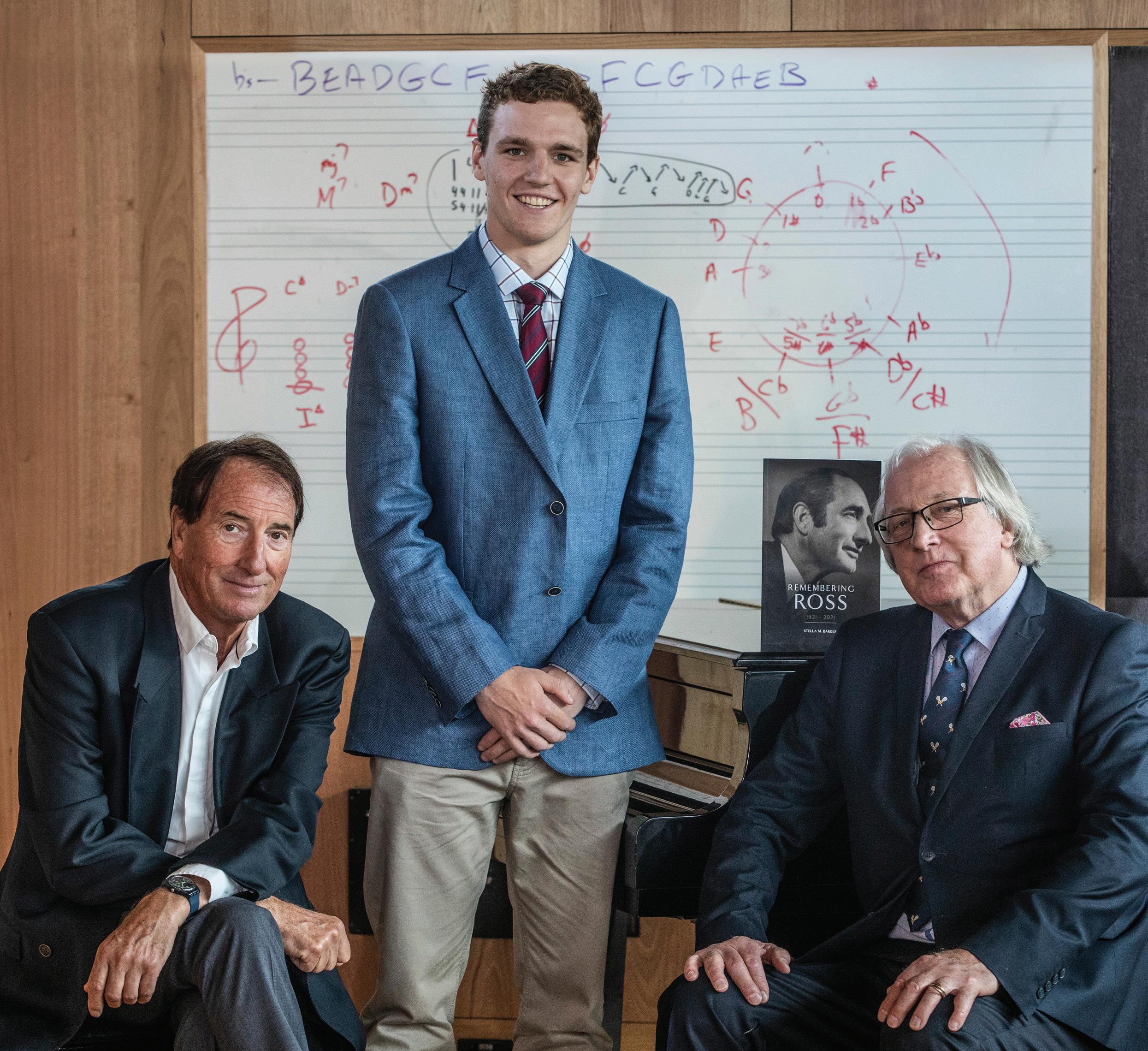
Grammar News No. 147 - April 2024 21
From left: David Shelmerdine (OM 1970), Harry Dudley (OM 2023), Stephen Shelmerdine AM (OM 1968)
Step behind the scenes of the 2024 Quad Play
The play has been selected. Production meetings have been held. Set and costume designers have been engaged, and the sound and lighting people are on board. The casting call has gone out, and the first audition is underway…
Welcome to the creation of the 2024 Quad Play – Julius Caesar.
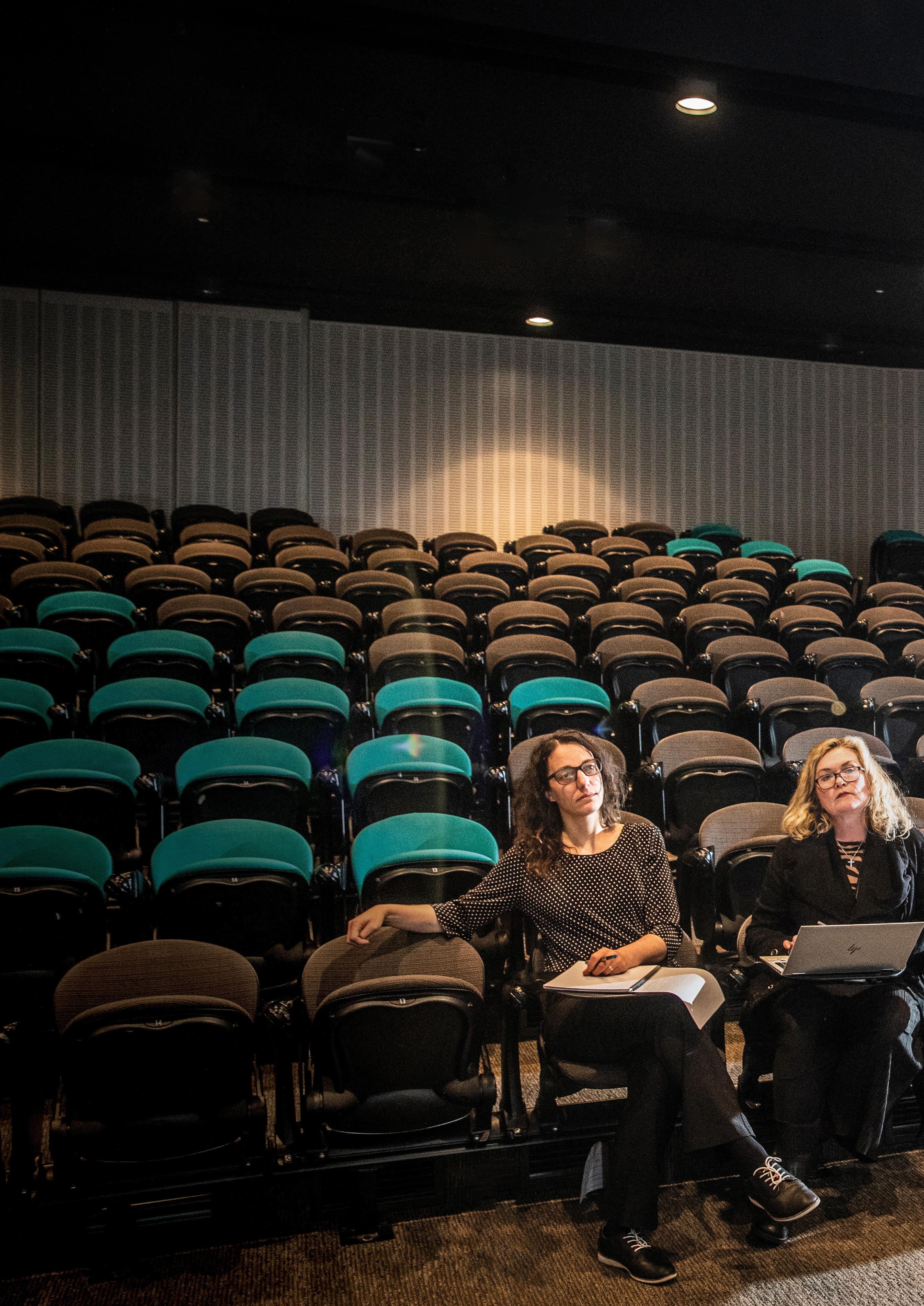
A note from the Director
William Shakespeare’s Julius Caesar explores the themes of power, politics and greed. Despite being written in 1599, it remains incredibly relevant today.
This year we chose to reimagine the play into a modern-day world setting, drawing on the notion of how social and mass media influence politics today. On our stage, the citizens of Rome are being bombarded with a cacophony of mis/information. Rumours spread, truths and untruths are told, and confusion escalates, while some, who are staunch in their beliefs, find a dangerous voice louder than ever before. People are divided and war inevitably unfolds with devastating consequences.
It was a pleasure to present Julius Caesar in this 50th anniversary year.
Belinda Annan Director
22
School 50TH ANNIVERSARY OF THE QUAD PLAY
Melbourne Grammar
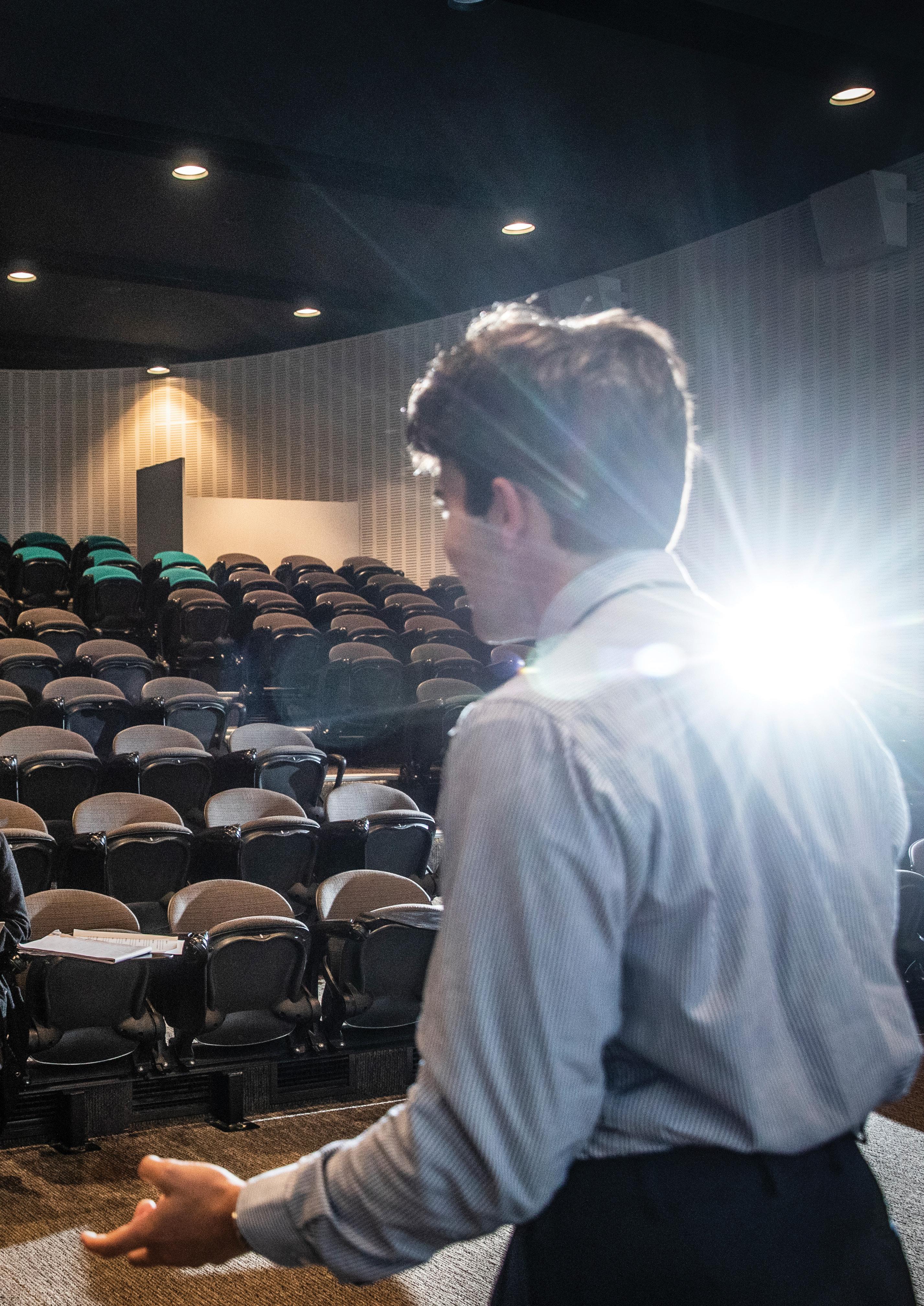
23 Grammar News No. 147 - April 2024
Rehearsals and more
NOV 2023 – FEB 2024


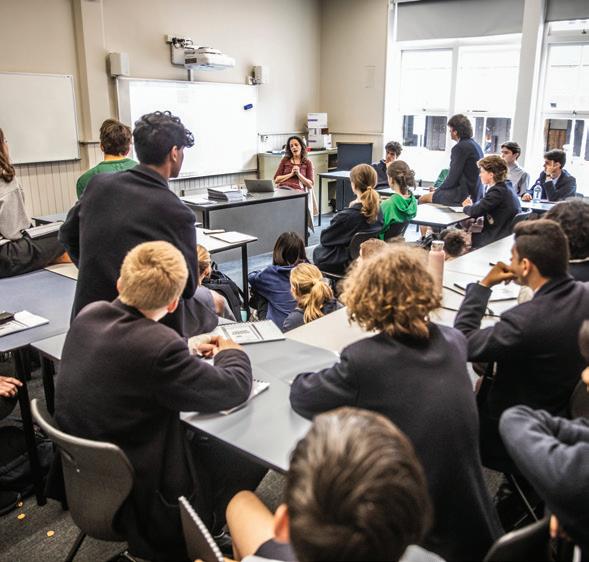



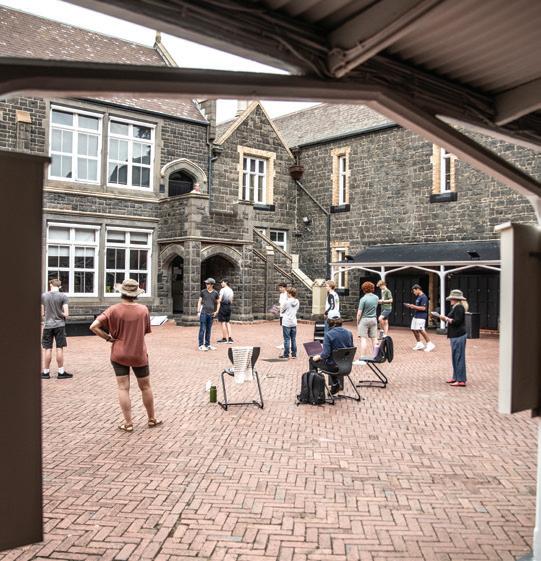
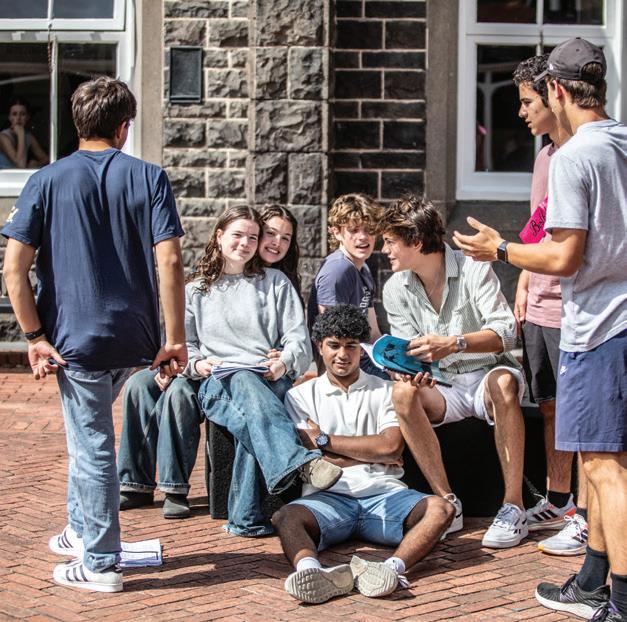

Se tt ing the stage
DEC 2023 – MAR 2024

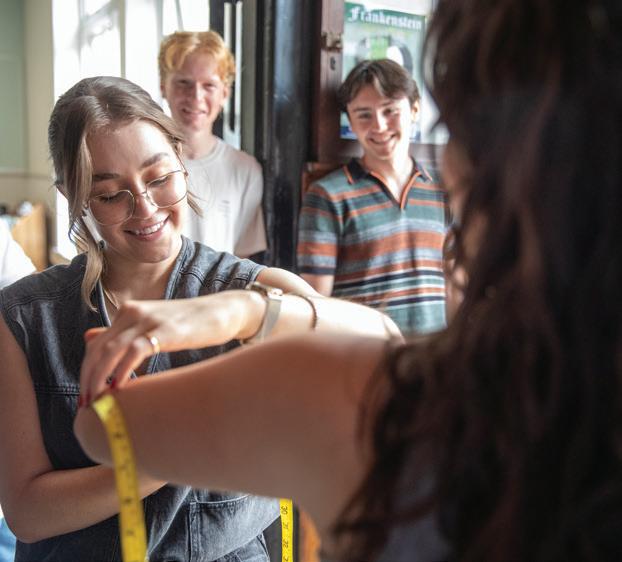
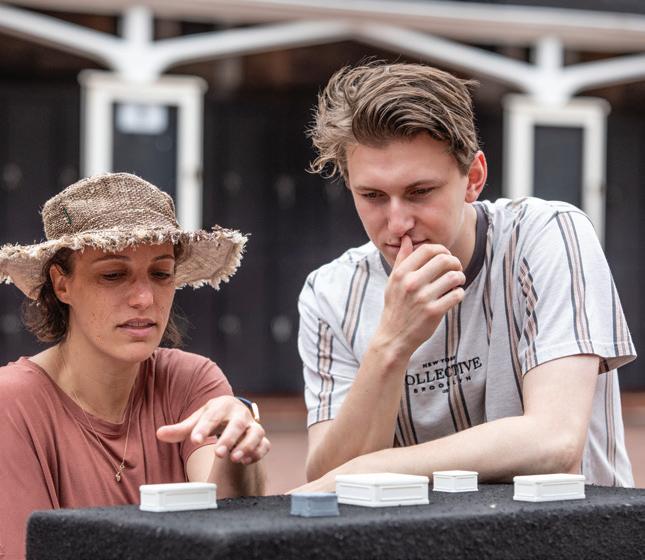

Everyone in the cast contributed to the success of the whole, and their absolute commitment to and ownership of the whole thing was palpable in every movement and every lively crowd interjection.
Tim Scott, past Director of the Quad Play

Well done on producing such an excellent production; it truly was a sterling way to mark 50 years of
Philip Grutzner, Headmaster


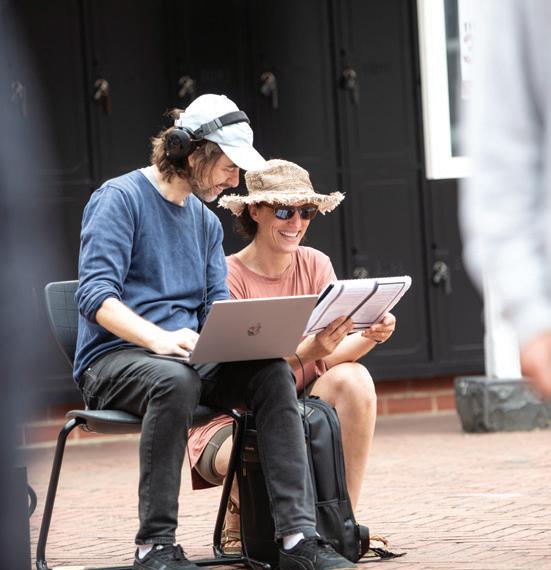

Melbourne Grammar School 24
...and some downtime amidst the hustle
50TH ANNIVERSARY OF THE QUAD PLAY
The set designer visits the Quad
Getting measured for costumes
Let's talk sound
Bumping in the set and seating
Quad Plays.
...and continue
The cast meets for the first time
Rehearsals commence
Behind the scenes

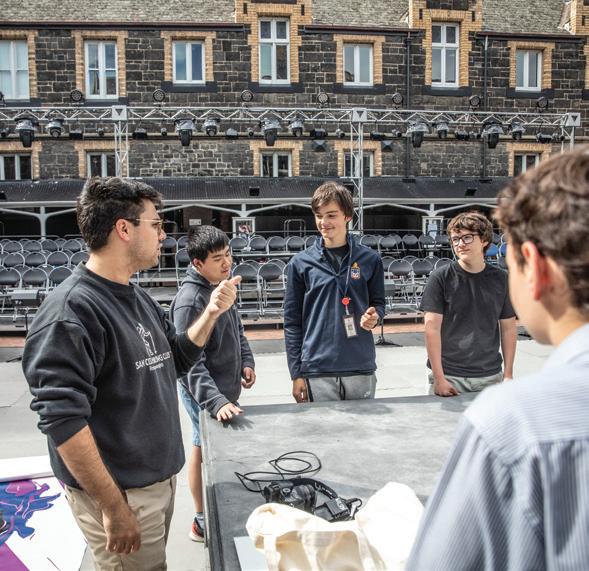

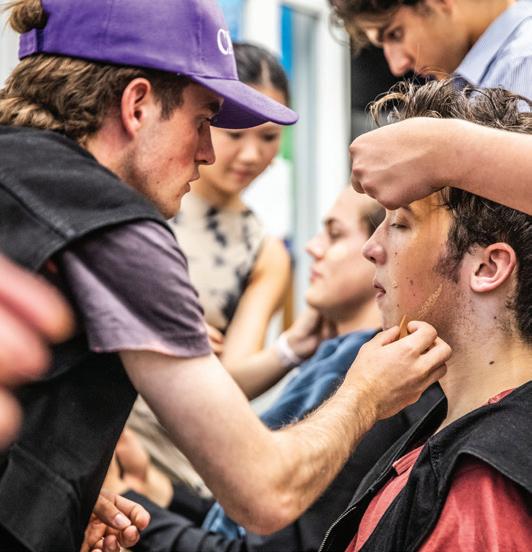


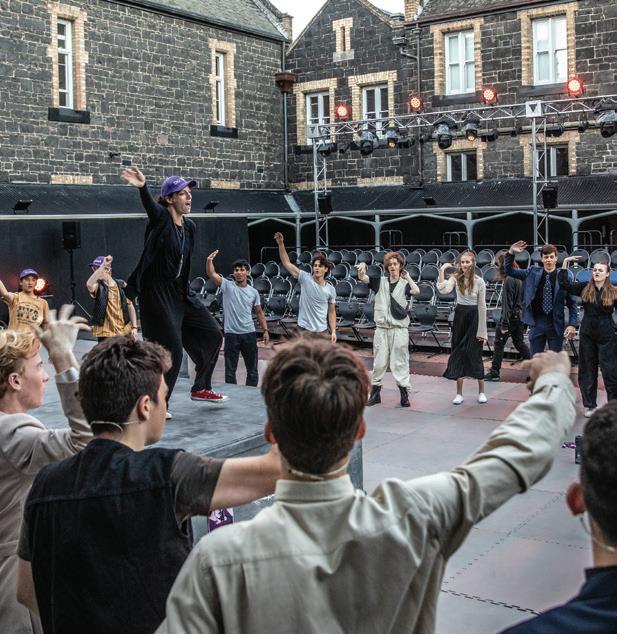
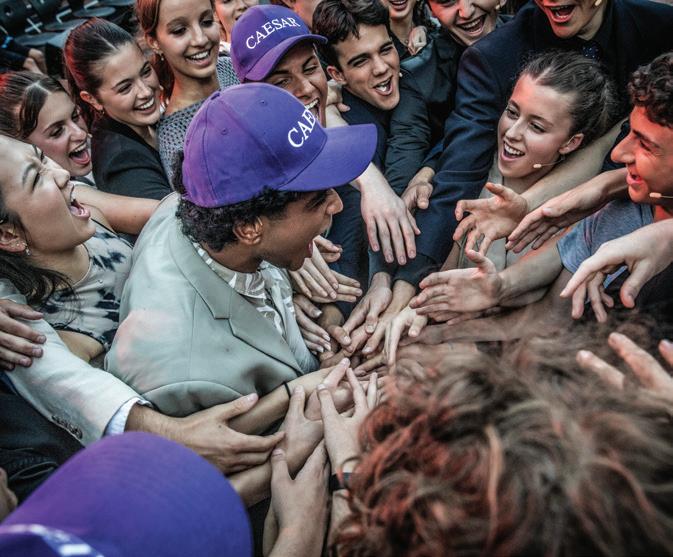

I adored seeing all those teenage boys thoroughly invested in a 400-year-old play about a 2000-year-old ruler. And, wow, were there some fine performances. Both our boys have just loved being part of it.
Kim Kane, parent
The performance
28 FEB, 29 FEB, 01 MAR 2024




Emthusiam abounds
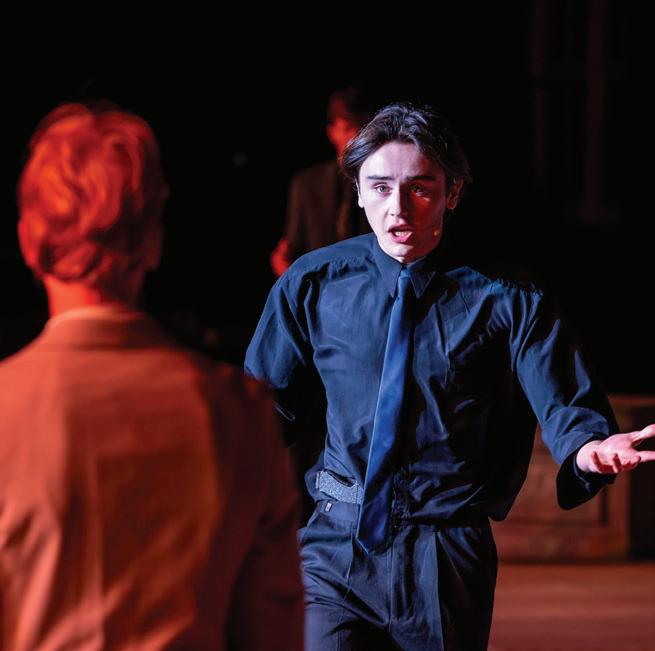



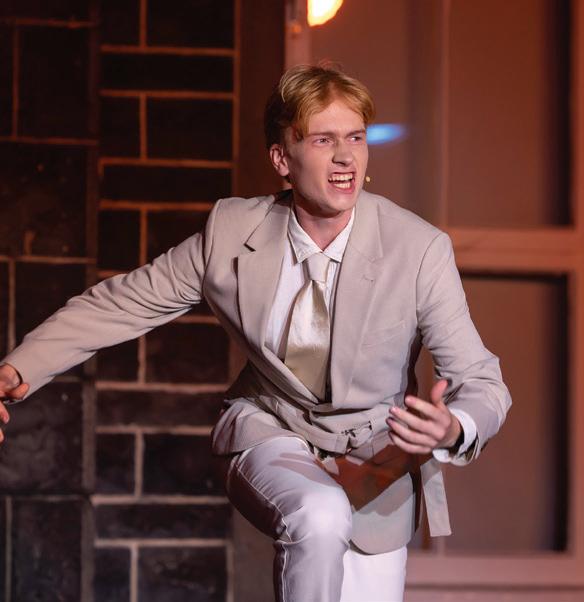


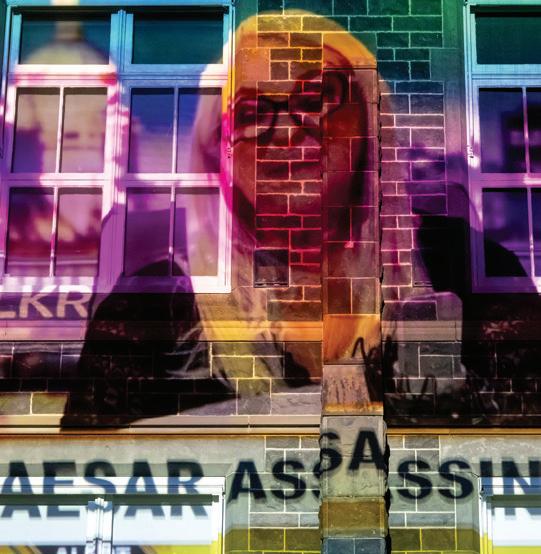


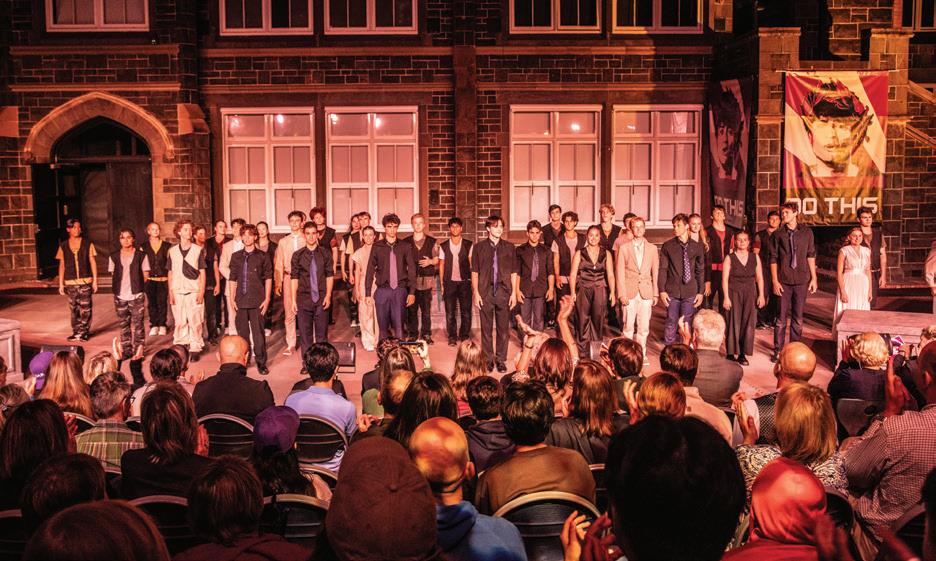
Grammar News No. 147 - April 2024 25
Well done to the cast, crew and creatives
What have they done?
The backstage crew confers
Warming up
Projection transforms the Quad
Et tu Brute
The conspiracy grows
War ensues
The media takes centre stage
50 years of the Quad Play Celebra t ing
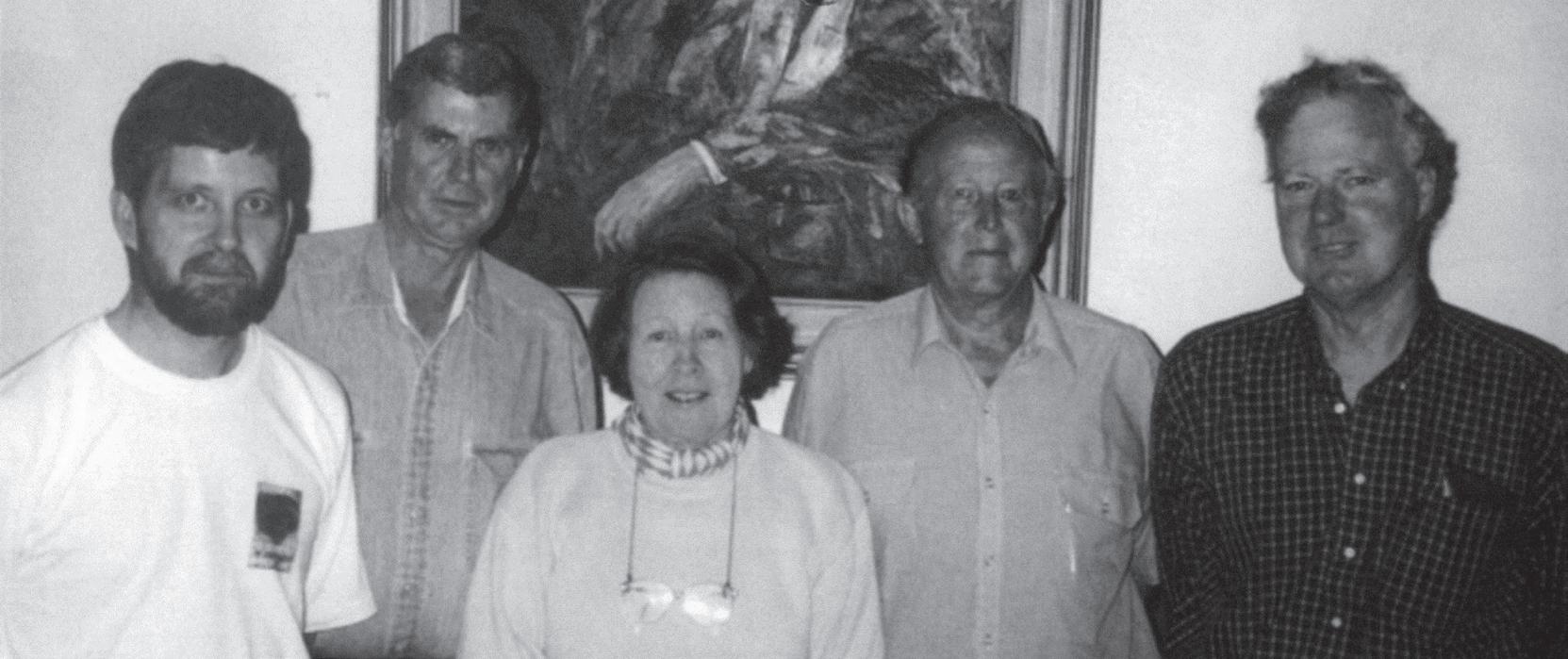
Quad Play producers 1974 – 1999.
It’s a balmy late-summer evening. The crowd has gathered, the music plays, the lights come on. And so the magic begins.
The Quad Play is one of the significant legacies of Nigel Creese’s Headmastership (1970 – 87). The first production, Romeo and Juliet, was in 1974, and there has been a play performed in the Quad every year since (occasionally two). Even the pandemic couldn’t stop it: the 2020 and 2021 Quad Plays happily managing to escape the various lockdowns.
EARLY YEARS
In 1974 I was in my final year as a student at Melbourne Grammar School and was lucky enough to be chosen to conduct a small string ensemble that played during the interval of that production. I remember it rained on two of the three nights, but the show went on regardless! Nigel was very determined about that.
In those early years, the plays were performed on a make-shift wooden stage, with the audience sitting on chairs on the ground. In 1991, for the first time, tiered seating on scaffolding was introduced to allow better viewing and a larger stage area; that model has been used for the majority of plays since.
SHIFTING STAGES
The vision for the first Quad Play undoubtedly owed much to the physical shape of the western end of the Quad, the bluestone balcony ideally suited to Juliet’s early scenes with Romeo.
Subsequent productions saw it used as battlements, musicians’ gallery and even the deck of a foundering ship, but it was not long before the setting migrated to other parts of the Quad, first to the Chapel end, then to the centre and once, memorably, stretched almost end-to-end with the audience on the two long sides for the 2001 Antony and Cleopatra
From left: Tim Scott, Ross Clayton, Val Creese, Nigel Creese, Geoff Smith
For the 1997 Midsummer Night’s Dream we built a large pond in the middle of the Quad, with real plants and live fish.
More recently, Sydney Rd was recreated in the heart of the Bluestone for 2022’s Romeo and Juliet, and the front of the Chapel and its doors were used to great effect in last year’s Macbeth. The only common factor: the bluestone walls and ambience of the Quad.
MUSIC AND LIGHTS
Music has always played a vital role. Nigel Creese believed it should always be live, not recorded, and often originally composed for the production by a current student. Some directors, however (including me), couldn’t resist the temptation to introduce a bigger soundscape, using recorded music. I suspect Nigel didn’t approve though he never said anything. He never missed a Quad Play.
26 Melbourne Grammar School
50TH ANNIVERSARY OF THE QUAD PLAY
The advent of LED lights in recent years has been another significant innovation: no more rushing to cover the lights when the rain started falling! And, of course, with LED lights came an infinite array of colour, easily switched from one scene to the next and creating marvellous splashes of colour on the bluestone; not to mention spotting the occasional startled possum innocently crossing the roof-ridge mid-performance.
UNSUNG HEROES
The honour roll of those who have helped shape the Quad Play into the enduring success it is includes a number of very significant “unsung heroes”, both members of staff and Old Melburnians.
When Lawrence Doolan joined the Maths Department in 1976, he was immediately recruited to join the production team for those hot rehearsals in February. Along with a team of boys, he would construct the wooden stage each year until they graduated to building the scaffolding for the audience to sit on, with the actors performing on the bricks.
Michael Arnold, another mathematician, was responsible for lighting from 1974 until his retirement in 1987, scaling the lighting tower as if he was born to it.
Backstage, co-Producer Val Creese designed and made costumes for the first fourteen years, while Geoffrey Smith – who would direct the 1989 Quad Play – added his historian’s eye; he would later be assisted by Sally Scott, Kylie Witt and Darlene Fisher.
Meanwhile Old Melburnians Richard Burman (OM 1955) and Mark Williams (OM 1976) led a make-up team responsible for transforming teenage actors into credible adult characters. In charge of Front of House was Michael Wilkins, long-time English teacher, always ready with some pointed words to marshal the last-minute arrivals. More recently, Leah Kelly and Matthew Di Petta have also contributed significantly.
SO MANY MEMORIES
If those stones could speak, what stories would they tell and what memories would they hold? The Quad has seen it all: vigorous sword-fights, tender love scenes, actors carrying flaming torches, various bodies carried on and off on biers.
And, of course, so many young actors inhabiting mature characters with such energy and confidence, some of them going on to professional careers (Huw Williams (OM 1977), Barrie Kosky (OM 1984), Simon Stone (OM 2001) and Jack Martin (OM 2013) are just some who spring to mind), others possibly never to grace the stage again, but all captivated by the magic of the Quad and its limitless possibility.
It is a wonderful tradition that Nigel and Val and Ross Clayton started fifty years ago. Long may it flourish.
Dr Tim Scott (OM 1973)
Director of the Quad Play, 1988; 1990-2001
27 Grammar News No. 147 - April 2024 Quad Plays 1974 Romeo & Juliet 1 1975 Twelfth Night 2 1976 Hamlet 2 1977 King Lear 2 1978 Macbeth 2 1979 A Midsummer Nights Dream 1 1980 Oedipus 3 1980 The Taming of the Shrew 3 1981 The Winters Tale 1 1982 Othello 1 1983 Antony & Cleopatra 1 1984 Romeo & Juliet 1 1985 Antigone 4 1985 The Comedy of Errors 4 1986 King Lear 1 1987 Hamlet 1 1988 As You Like It 5 1989 The Merry Wives of Windsor 6 1990 Richard III 5 1991 The Tempest 5 1992 Much Ado About Nothing 5 1993 Macbeth 5 1994 The Bacchae by Euripides 5 1994 The Two Gentlemen of Verona 5 1995 Richard III 5 1996 Hamlet 5 1997 A Midsummer Nights Dream 5 1998 The Winters Tale 5 1999 King Lear 5 2000 Love's Labour's Lost 5 2001 Antony & Cleopatra 5 2002 Julius Caesar 7 2003 Romeo & Juliet 7 2004 Twelfth Night 7 2005 Macbeth 7 2006 The Tempest 8 2007 Dr Faustus by Christopher Marlowe 8 2008 Othello 8 2009 A Midsummer Nights Dream 8 2010 Hamlet 8 2011 Much Ado About Nothing 8 2012 The Bacchae by Euripides 8 2013 Twelfth Night 8 2014 Antony & Cleopatra 8 2015 As You Like It 8 2016 Romeo & Juliet 8 2017 King Lear 8 2018 Antigone 8 2019 Richard III 8 2020 A Midsummer Nights Dream 9 2021 Two Gentlemen of Verona 9 2022 Romeo & Juliet 9 2023 Macbeth 9 2024 Julius Caesar 9 DIRECTORS 1 Nigel Creese, Ross Clayton & Val Creese 2 Nigel Creese & Ross Clayton 3 Nigel Creese, Ross Clayton, Val Creese & Lawrence Doolan 4 Nigel Creese, Val Creese & Tim Scott 5 Tim Scott 6 Geoffrey Smith 7 Matthew O'Meara 8 Sharon Mulready 9 Belinda Annan
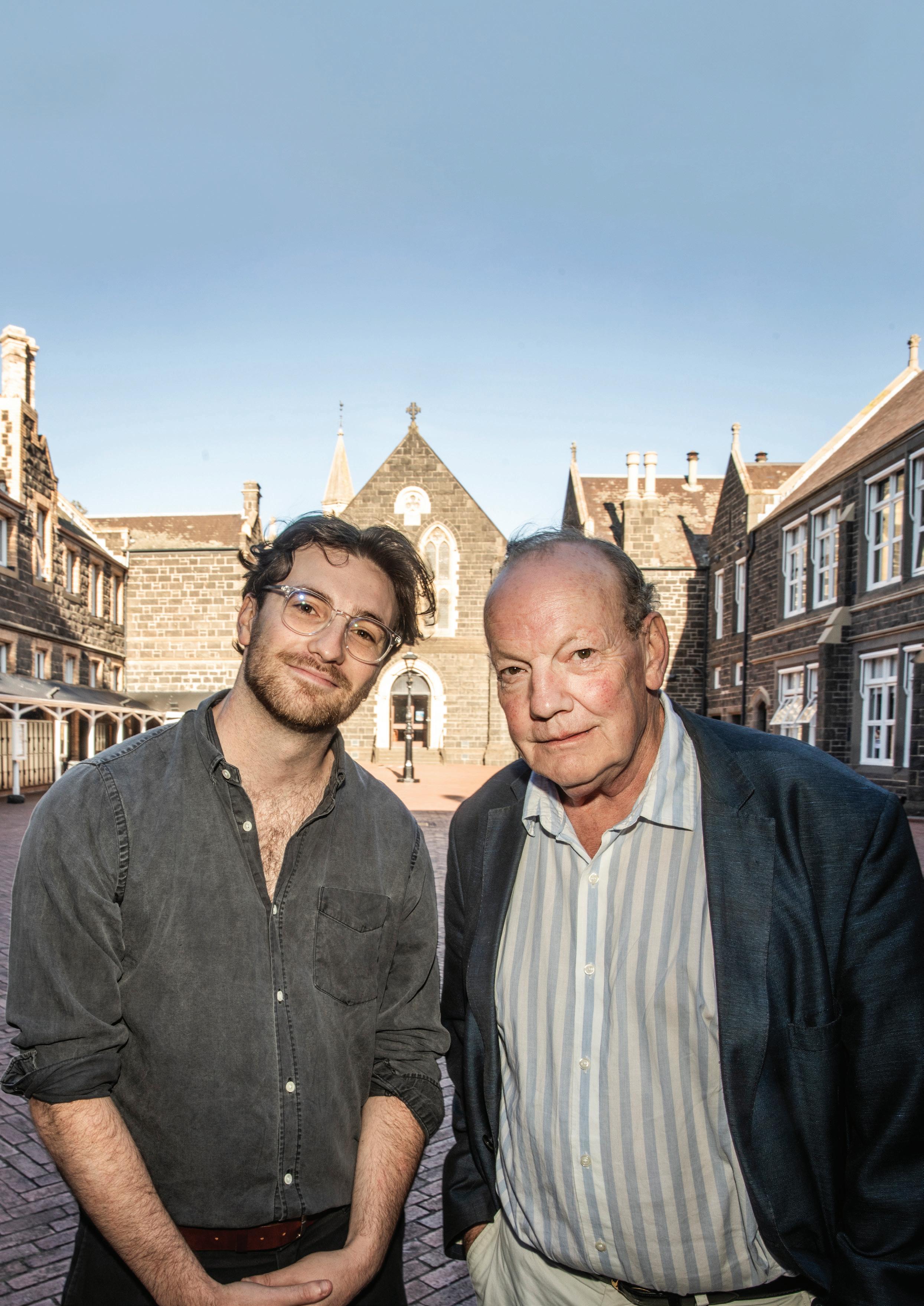
A father-son history with the Quad Play
28 Melbourne Grammar School
Melbourne Grammar School’s Quad Play holds special memories for father and son Tony Rickards (OM 1974) and Ed Rickards (OM 2015), both of whom have since forged careers in different aspects of the entertainment industry.
GROUNDBREAKING THEATRE
Playing the role of Benvolio in the very first Quad Play, Romeo and Juliet, in 1974, Tony has a unique perspective on the introduction of Nigel Creese’s “brilliant” new approach to theatre.
“His decision to stage the production in the Senior School bluestone quadrangle felt groundbreaking,” he says. “Being outdoors, and with its natural areas for staging, the Quad was the perfect place to stage a Shakesperean play. It also made us understand that theatre can be anywhere. That was very educational.”
Tony returned to the stage the following year as Sir Toby Belch in the Twelfth Night, complete with a large stomach prop made by his mother Dorothy.
Following in his father’s footsteps, Ed also acted in a Quad Play playing Dercetas in the 2014 production of Antony and Cleopatra “Despite my leaning towards comedic theatre, I really enjoyed studying Shakespeare so in Year 9, my first year at the School, I went along and watched the play and really enjoyed it,” he says. “I felt encouraged to join the cast the following year and I have very fond memories of performing in the production. It was also a great way to make new friends.”
BEYOND THE QUAD PLAY
Tony is a well-known comedian and actor. He has performed nationally in radio, film and television since the late 1970s. From playing Con Marasco in the trailblazing radio program Punter to Punter to roles in Kath & Kim, Blue Heelers, A Country Practice, Wentworth and The Newsreader to name just a few, Tony continues to act and present even now. “I’ve had a pretty rewarding time of it, as an actor,” he says.
Being outdoors, and with its natural areas for staging, the Quad was the perfect place to stage a Shakesperean play. It also made us understand that that theatre can be anywhere. That was very educational.
Having been awarded Drama, English and Legal Studies Prizes, as well as Academic and House Colours for his various achievements in Year 12, Ed decided to pursue a career in law while still maintaining his passion for performing.
Ed performed in and directed Law Revues while at university. He continues to take to the stage in various comedic roles, most notably in Melbourne Comedy Festival shows.
In 2022, Ed completed his Bachelor of Laws (Hons) with First Class Honours at Monash University as well as a Bachelor of Arts, majoring in Theatre & Performance. He now works as a lawyer, specialising in entertainment law.
“What I enjoy most is learning about the entertainment industry –understanding how an idea goes from development to the screen to selling internationally; I love learning how that all works,” says Ed. “It’s also always great talking to Dad about the industry and how it has changed over the past 50 years. I want to stay in the industry for the rest of my career.”
Note: We believe Tony and Ed to be the only father and son who have both performed in the Quad Play. We would like to hear from you on mgs@mgs.vic.edu.au if you are aware of any others.
Grammar News No. 147 - April 2024 29
50TH ANNIVERSARY OF THE QUAD PLAY
From left: Ed Rickards (OM 2015), Tony Rickards (OM 1974)
A transformation to strengthen Outdoor Education
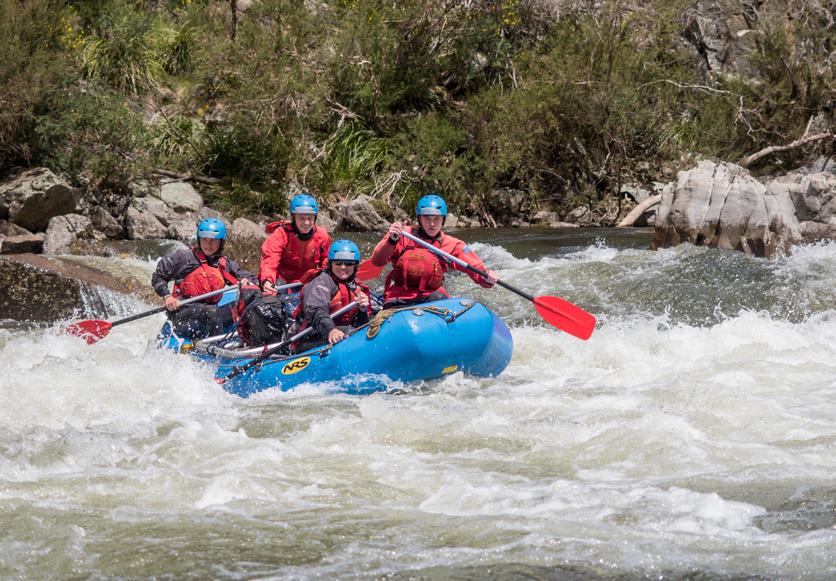
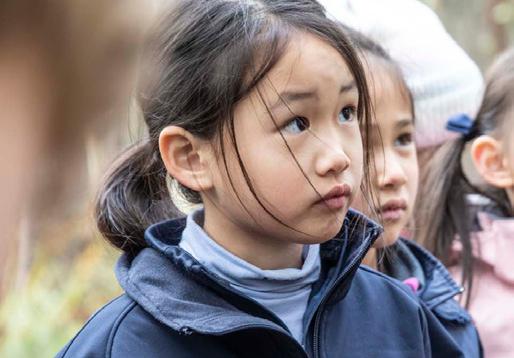
Our Outdoor Education program is a unique, beloved aspect of our curriculum. In 2024, to align with the School’s Towards 2030 strategic intentions, along with our values and priorities, the delivery of this program is being renewed.
“The approach we’re taking means we will be offering a carefully designed progression of experiences in the natural environment all the way from Prep to Year 12,” explains Nic Bishop, Director of Outdoor Education. “The new structure is student-focused and sequential, with purposeful ‘peaks’ built in, creating a journey that continues throughout each students’ time at the School.”

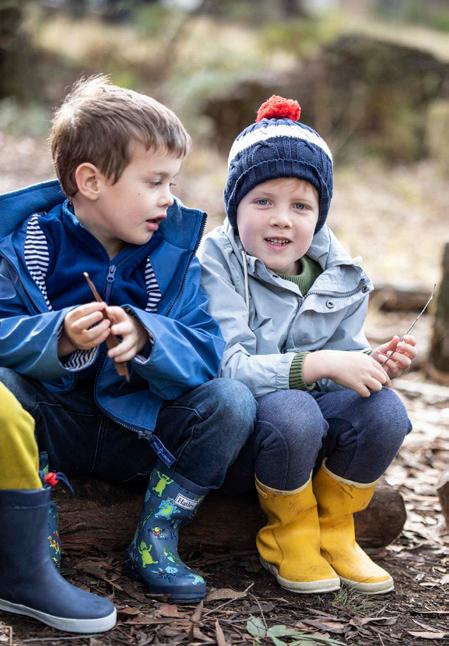
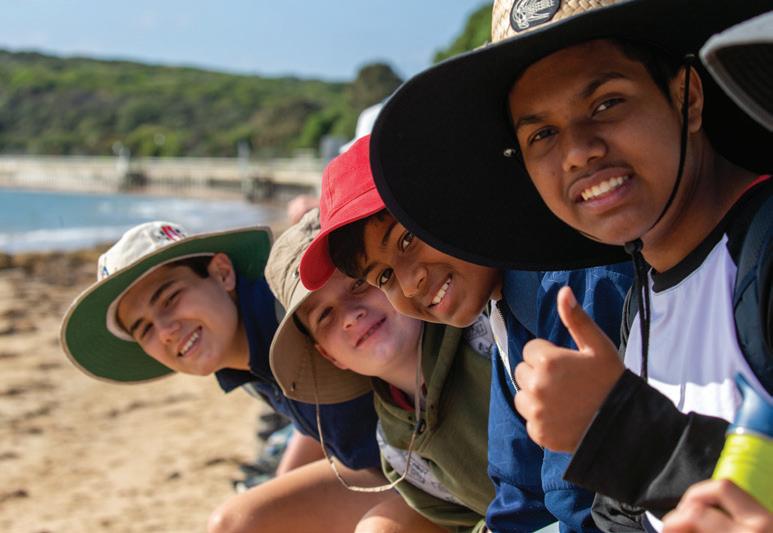
DESIGNING A COHESIVE JOURNEY
Across the 11 years from Prep to Year 10, Outdoor Education experiences range from Prep students’ first Forest School at Camp Robert Knox through to the 20-day Beyond the Gates expedition that marks the midpoint of the journey through Senior School. In Years 9 – 12, students also have the opportunity to join the Leslie Gladstone Robertson (LGR) Society, which sees student groups leading their own bushwalking expeditions without direct staff supervision.
“The beauty of our Outdoor Education program is the way it contributes to the development of a student’s identity, understanding of self, and connection to others – particularly in times of challenge or adversity,” says Nic. “In Year 6, for example, students camp on 90 Mile Beach at a location that can only be reached by boat. This is a real test of everything they’ve learned in previous years about personal resilience and a capacity to work with others.”
Each experience in the refreshed program builds on classroom learning, as well as offering moments of awe, wonder, and a sense of place.
SCHOOL NEWS Melbourne Grammar School 30
“We know that novel environments are fantastic for grabbing the attention of a student,” says Nic. “Novelty can often help recollection more than repetition, so linking classroom concepts with outdoor experiences means students can make some really strong learning connections.”
INVESTING FOR RESILIENCE AND FLEXIBILITY
The improvements made to support these activities include permanent outdoor educators who work full-time across our three campuses.
“This means students will have established relationships with the people who will run their next camp or outdoor experience, and our classroom teachers aren’t expected to be the experts,” explains Nic. “We now have the flexibility to design the program based on the strength of our team. The Outdoor Education department includes qualified teachers, expert activity instructors, and highly skilled outdoor guides –all passionate educators with broad knowledge and experience aligned with the needs and values of our community.”
The changes in 2024 will ensure our students can learn and grow with both a dedicated team and the quality resources required to manage the complexities and risks involved with contemporary outdoor education. Individual programs are being purposely crafted and responsive to the needs of students, with adaptability in everything from campsite selection, educational resources, and even the menu.
Above all, Nic says the goal of our Outdoor Education program is to build skills, resilience, and a sense of confidence that will serve students throughout their lives.
“Our purpose is to create enduring understandings. The social and emotional connections we create, along with the cognitive skills and shared experiences students have, will be with them for life.”
Beyond the Gates
Occurring at a reflective moment in their Senior School journey, Beyond the Gates (BTG) is a 20-day trip for Year 10 students, beginning with a smoking ceremony in the Chapel of St Peter, pausing mid-way for an empowering 36hour solo camp, and culminating with a final multi-day leg in which students manage their expedition independently – the previously critical outdoor educators stepping back into advisory roles.
Responding to changing environmental conditions and enabling all groups to undertake their BTG experience concurrently, expeditions will now run across four locations, including along the original Beyond the Gates route.
Still operating in small groups, students will be allocated to expeditions based on their preferences around venue and companions.
The 2024 locations are:
KARRI TO COAST: WA
A challenging walk among towering forests, off-track over coastal scrub and grass-tree plains, rafting across Nornalup Inlet, and traversing wild beaches, the Bibbulmun Track hosts this expedition that explores a rarely visited corner of Australia.
ALPINE JOURNEY: NSW/ACT
Commencing at the northern end of the Australian Alpine Walking Track near Canberra, this journey will cross stunning open plains, snow gum forests, paddle across the expanse of Lake Eucumbene and delve into our nation’s Indigenous and colonial cultural legacies.
SUMMIT TO SEA: NSW/VIC
Starting with a long hike through the Kosciusko National Park and finding the headwaters of the Snowy River, before exploring the Pilot Wilderness Area, students will descend in rafts the full length of the remote and stunning Snowy to reach the ocean at Marlo, Gippsland.
THE CLASSIC: VIC/NSW
An iconic and timeless journey, perfectly paced to cross the Victorian and NSW Alps on foot, raft and cycle, over a huge range of environments: alpine, forest, riverine, farmland, foothills and plains.
Leslie Gladstone Robertson (LGR) Society
Founded in 1958, the LGR Society still offers a unique leadership experience for Year 9 – 12 students today. Older students design and lead their own bushwalking groups across four expeditions each year. Participation is voluntary. In 2024, expeditions will include:
• Leadership Development at Breakfast Creek (Autumn)
• Flagship Expedition in Northern Flinders Ranges (Winter)
• Victorian Exploration at Wilsons Promontory (Spring)
• Service and Community at Breakfast Creek (Summer)
The LGR Society is generously supported by the bequest of Leslie Gladstone Robertson (OM 1899) who wished to “promote the moral and physical development” of Senior School students.
Grammar News No. 147 - April 2024 31
A glimpse into American basketball culture
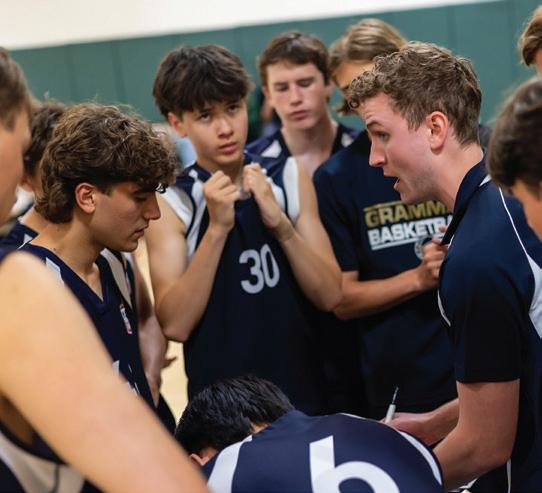

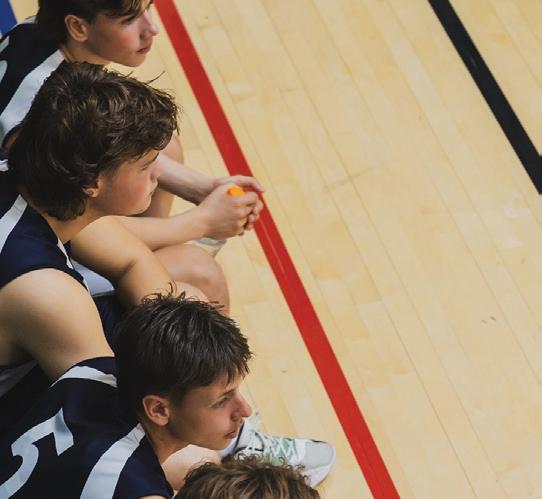
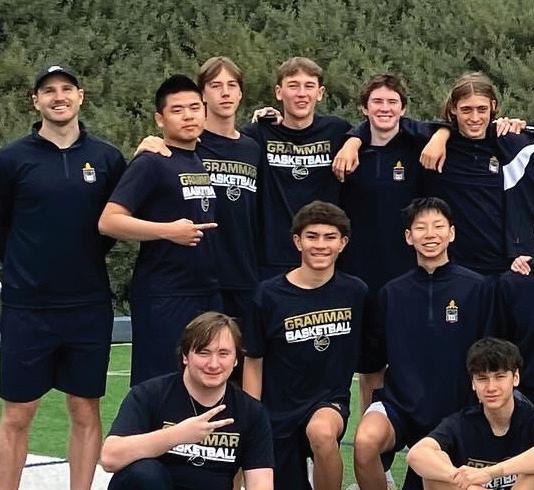
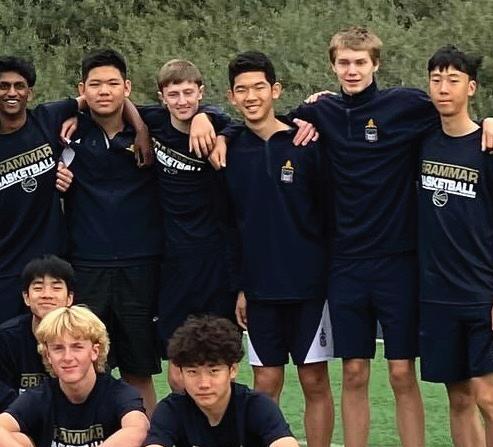

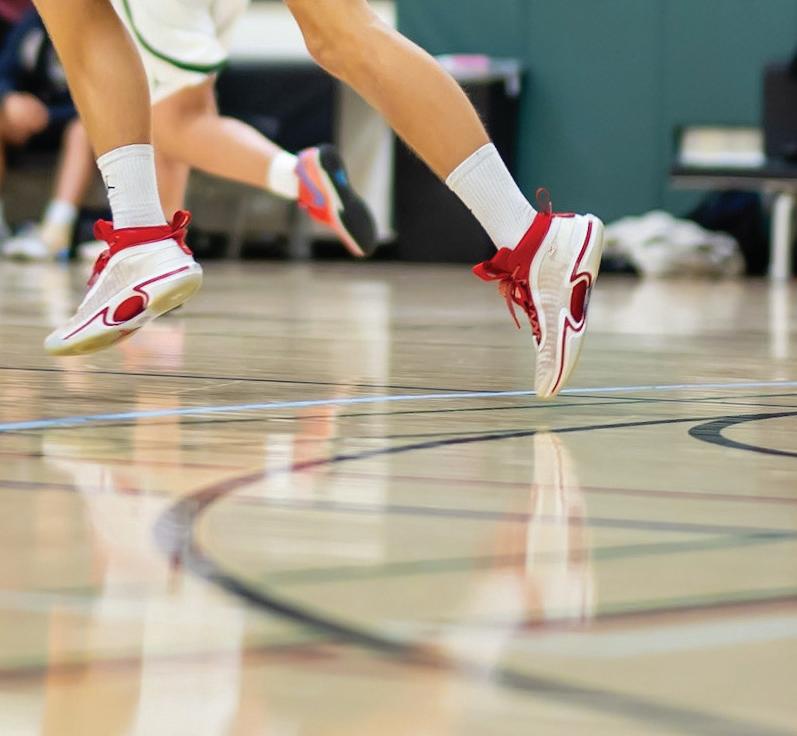
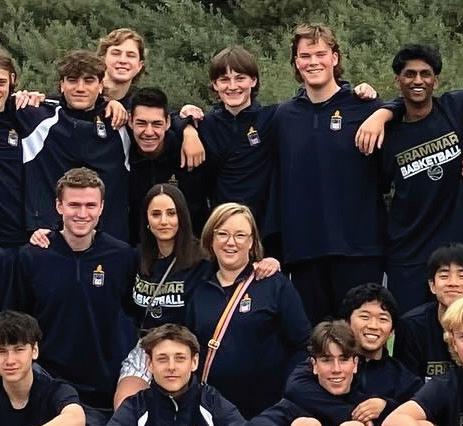

Year 12 student, Baxter Kam, was a member of the Melbourne Grammar School USA Basketball Tour team. Over a two week period in December 2023, the group visited National Collegiate Athletic Association (NCAA) Colleges, competed in games against American high schools, attended both College and NBA games and undertook elite training sessions with professional athletes.
Here, Baxter reflects on what he learnt about the basketball culture in the USA.
Intended to improve our sporting abilities, the USA basketball tour was also an enlightening experience. We already knew that the sport of basketball has a lower profile here in Australia compared to the United States. What we didn’t expect was the marked difference between our basketball culture, and that of the groups with whom we interacted.
Where the basketball experience at Melbourne Grammar School revolves around teamwork and fundamentals, the version of the sport at the American schools we played against almost seemed to be more focused on the show than the substance, where neologisms like ‘posterising’ (dunking over an opponent) take centre stage.
The majority of teams we played succeeded on an individual level, using their players’ raw athletic ability or individual skills to score. This contrasted with our method, which was focused on a team-first defence followed by a structured offence. The hardwood became a facilitator for the dance between individual skill and team play.
In these American schools, sport also seems to be held in higher esteem than it is in schools like ours. It represents an opportunity for success, often offering a pathway for scholarships at university.
For the elite players, it is a training ground for the professional level.
In attending College and NCAA games, it seemed to me that, if Australian professional basketball is the introvert, then American professional basketball is the extrovert that wears ostentatious shoes, blasts music, has three mascots and waves its flag at every opportunity. The strong national pride, interwoven with the excitement of show-business and the spectator’s increased adrenaline levels, was pure theatre. The anthem was sung before each game, while a 30-foot flag was held and waved on the court (a procedure we featured in on the court). As this happens, screens in the arena transform into a waving American flag and fireworks are set off. The crowd then is sent into a frenzy as the words “land of the free and home of the brave” are sung ceremoniously.
During our tour, we observed a basketball culture that represented some of America’s greatest qualities, while we also gained a unique introspection into the USA.
Melbourne Grammar School 32
SCHOOL NEWS
Nurturing friendships at Grimwade House
Helping students learn how to navigate friendships is an important aspect of Melbourne Grammar School’s pastoral care program, and this begins in Prep at Grimwade House.
“We believe that strong and positive friendships are one of the cornerstones of happiness for many people, and we know that happy children are more predisposed to learning,” says Jane Thomas, Deputy Head of Grimwade House. “This is why we have explicit strategies in place to help them build the skills and attitudes needed to develop meaningful and long-lasting friendships.”
A SHIFT IN FRIENDSHIPS OVER TIME
There is significant evolution in how children approach building friendships across their primary school years according to Jane. “Prep students are quite egocentric, so they tend to focus on the game they are playing in the playground, rather than who they are playing with,” she explains. “About halfway through Year 1 we notice a shift towards more collaborative play, and then in Year 2 a more noticeable change occurs when games become more formalised, and rule driven.”
The middle years of primary school education tend to be the most challenging for many children in terms of building relationships with their peers. At this point, negotiating friendships, managing friendship groups and hierarchies, and a big injection of hormones makes the process more complex. Children also become more aware of where they fit in the world, and a big part of their world is primary school.
“When students reach Years 5 and 6, and the use of social media begins to emerge, there is a necessary shift in the focus in our program,” Jane adds.
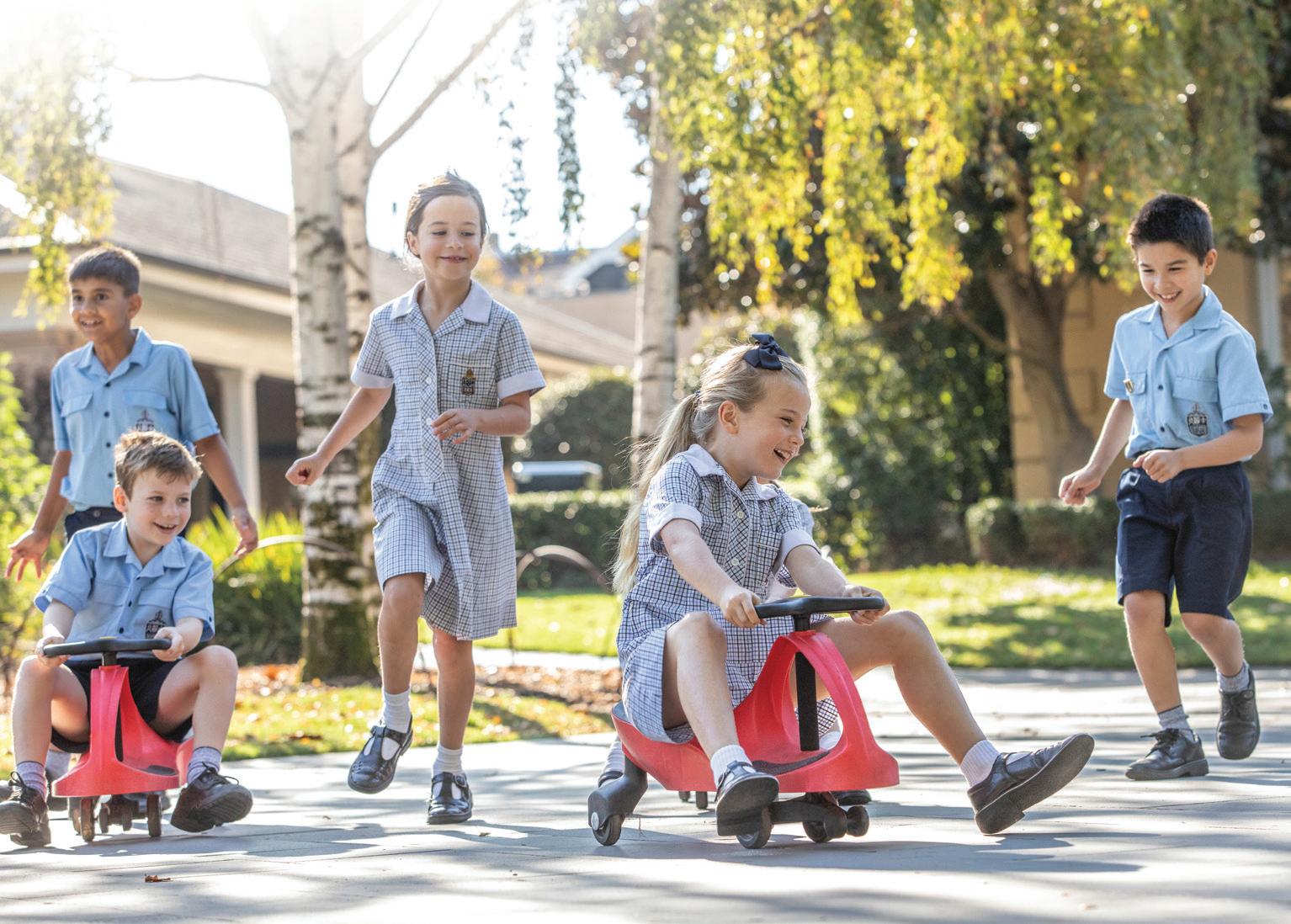
A CAREFULLY PLANNED APPROACH
“It is important to recognise that friendships tend to change throughout our lives,” says Jane. “Young children don’t always naturally have the skills or resilience to deal with this, so we work with our children to help grow their capacity to build new and strong friendships.”
“Our teachers are experts in guiding children through each of their developmental phases,” Jane says. “Our pastoral care program has specific intentions and actions which directly address friendship related issues.”
The structured program is designed to develop a consistent understanding and language relating to this area across the School. It is underpinned by values such as respect, kindness, loyalty and trust.
Explicit teaching around building positive and respectful relationships occurs in every classroom. For example, during Years 2 to 4, teachers ask students to firstly look at their own personal strengths and how they can use those to build friendships.
Classes discuss how friendships can change over time, and students are given specific strategies they can use in the playground every day. Students are invited to implement the strategies, then discuss how they worked for them and how they could adjust their approach.
“We also have strategies in place which are intended to prevent issues arising in the playground. As just one example, we have a ‘buddy bench’ for young students. If children can’t find anyone to play with, they know they can sit on the bench, and this is a signal to everyone else to invite them into their game. This works well for our youngest students,” says Jane.
If children need more guidance and assistance, teachers can call upon the School Psychologists and the Grimwade House pastoral care team for support.
“In the end, we want our School to be inclusive, harmonious and full of diverse friendships,” says Jane. “Guiding children to build the skills to have strong and positive relationships is crucial to a child’s development and we are proud of the welcoming and nurturing community that we have at Grimwade House.”
Grammar News No. 147 - April 2024 33
New perspectives, common ground
Recently I have come to see the School from a refreshed perspective.
I left school many years ago now. But I have come to realise through reconnecting myself with OMs and the School how powerful and enduring that sense of a common bond is. However different we may be as people, it is a simple truth.
As President of the Old Melburnians, I have the real privilege of attending all our reunions. It is striking how similar the atmosphere and emotion in the room is across generations. Whether it is a 1 or 70 Year reunion or anything in between, the sense of engagement and welcome is patent. I have never met anyone who fails to feel elevated by the experience.
Reunions are not just nostalgia. They are very much about being in the present. The conversations I hear are not just about memories, they are as much about today and tomorrow.
One thing I notice is how diverse the Old Melburnians who attend truly are. Inside the reunion, we are who we are and everyone is pleased to see you. I often notice that old friendships are rekindled and new common ground is found. There is no stereotype I can discern, except to say there is evidently a genuine pride in our School, in being an OM and the values we stand for.
These values create powerful throughlines in our lives. When the Old Melburnians Council recently wrote down our values and objectives, the results aligned with the School’s values closely. Even though I left school 43 years and three Headmasters ago, there is no doubt my values and yours remain relevant and recognisable in the School of today. The best test of that is the calibre of young person the School produces. They remain outstanding. The School makes a difference.
Of course, there is a lot more to the Old Melburnians than reunions. There are many ways to engage with each other and the School, wherever you are.

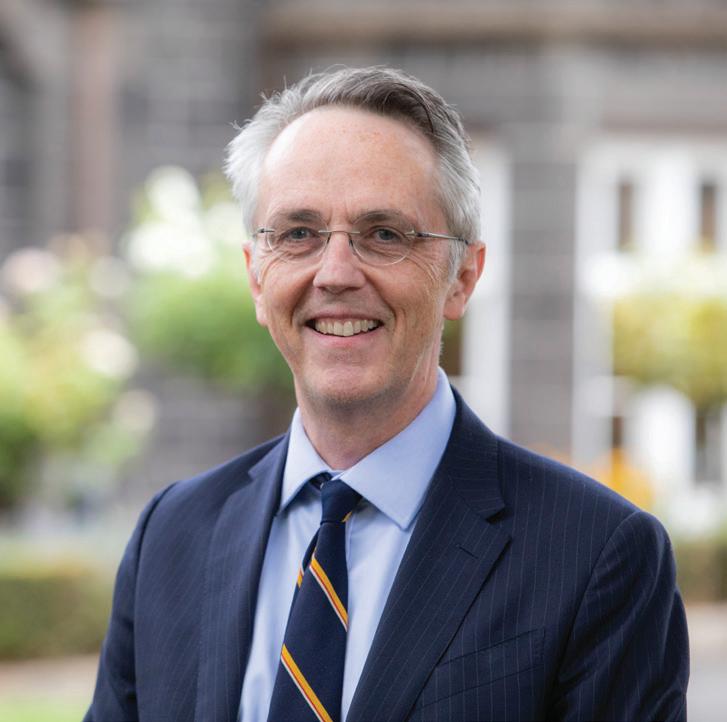
Martin Scott KC (OM 1980)
The Old Melburnians’ clubs, our OM Journeys series, business breakfasts, career mentoring and other opportunities are outlined on the OMs’ website.
The Old Melburnians Council is ultimately about enabling Old Melburnians to connect and reconnect within and across generations. I encourage OMs to tell us what they want. No matter when you left school or where you are in the world today, you belong.
Martin Scott KC (OM 1980) President The Old Melburnians
The
Old Melburnians
2024 ANNUAL DINNER
Date: Friday 14 June 2024
Time: 7.00pm – 11.30pm
Location: Zinc at Federation Square
Bookings: bit.ly/OMAnnualDinner2024

Paul Sheahan AM, Tim Morris (OM 1981), Alex Keath (OM 2010) join us as we pay homage to the history and legacy of Melbourne Grammar School by celebrating sport through the lens of Australia’s national sport - cricket.
A limited release of brandnew merchandise is available exclusively for Old Melburnians to purchase online, via QR code.

The new range includes an Old Melburnian scarf, cap, beanie and a choice of two styles of tie.
Beanie: $25 | Scarf $30 | Tie $20 - $30 | Cap $25
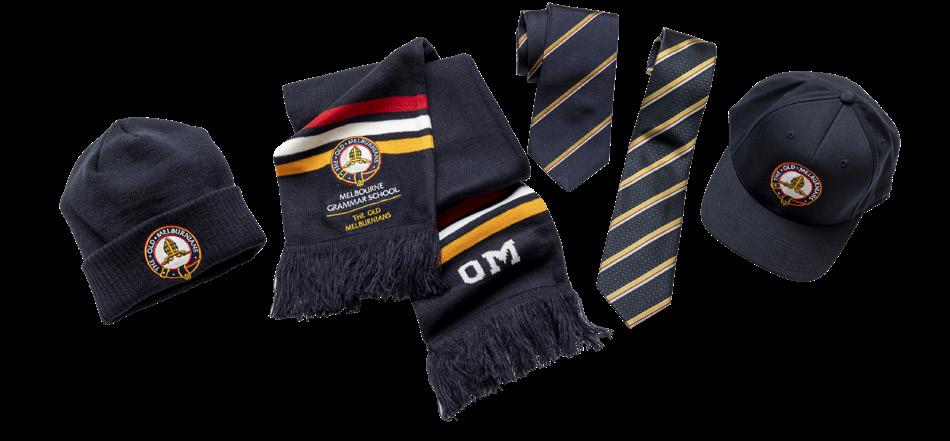
OLD MELBURNIANS
Merchandise
Introducing The 0ld Melburnians Council
The Old Melburnians Council aims to bring generations, old and new, together to create a better future.

Seated, from left:
Martin Scott KC (OM 1980), President
Anton Leschen (OM 1983), Vice-President and Chair, Communications and Database Sub-Committee
Penny Apted (OM 1994), Chair, OM Women Sub-Committee
Marc Cuming (OM 1983), Chair, Fellowship and Community Sub-Committee
Standing, from left:
Charles Thompson (OM 1987), Chair, Careers and Growth Sub-Committee
Edwina Burn (OM 2004), General Member and Sydney Branch Representative
Jeremy Nichols (OM 1983), Vice-President and Chair, OM Clubs Sub-Committee
Nik Devidas (OM 1997), Chair, Special Events Sub-Committee
Andrew Sutcliffe (OM 1986), Treasurer and Chair, Annual Dinner Sub-Committee
Douglas Tsoi (OM 2004), General Member and OM Clubs Liaison
To learn more about the role of
The Old Melburnians Council, visit bit.ly/OldMelburnians
The Old Melburnians Council
+61 3 9865 7682
om@mgs.vic.edu.au
Upcoming events
2024 OLD MELBURNIAN EVENTS
OM Theatrical Society Play
‘The Great Sebastians’
Thursday 18 – Saturday 20 April
Bellarine Branch Sunday Lunch
Sunday 21 April
ANZAC Service of Commemoration
Friday 26 April
Business Breakfast
Friday 10 May
Canberra Branch Cocktail Party
Friday 10 May
Cordner Eggleston Cup, Scotch College
Friday 24 May
Annual Dinner
Friday 14 June
London Branch Dinner
Thursday 4 July
Class of 2023 One Year Reunion
Friday 15 November
The Old Melburnians Annual General Meeting
Monday 18 November
Annual Bluestone Lunch
Friday 22 November
Visit bit.ly/mgs-events for more information.

Contact om@mgs.vic.edu.au to update your email address to ensure you receive your invitation.
35 Grammar News No. 147 - April 2024
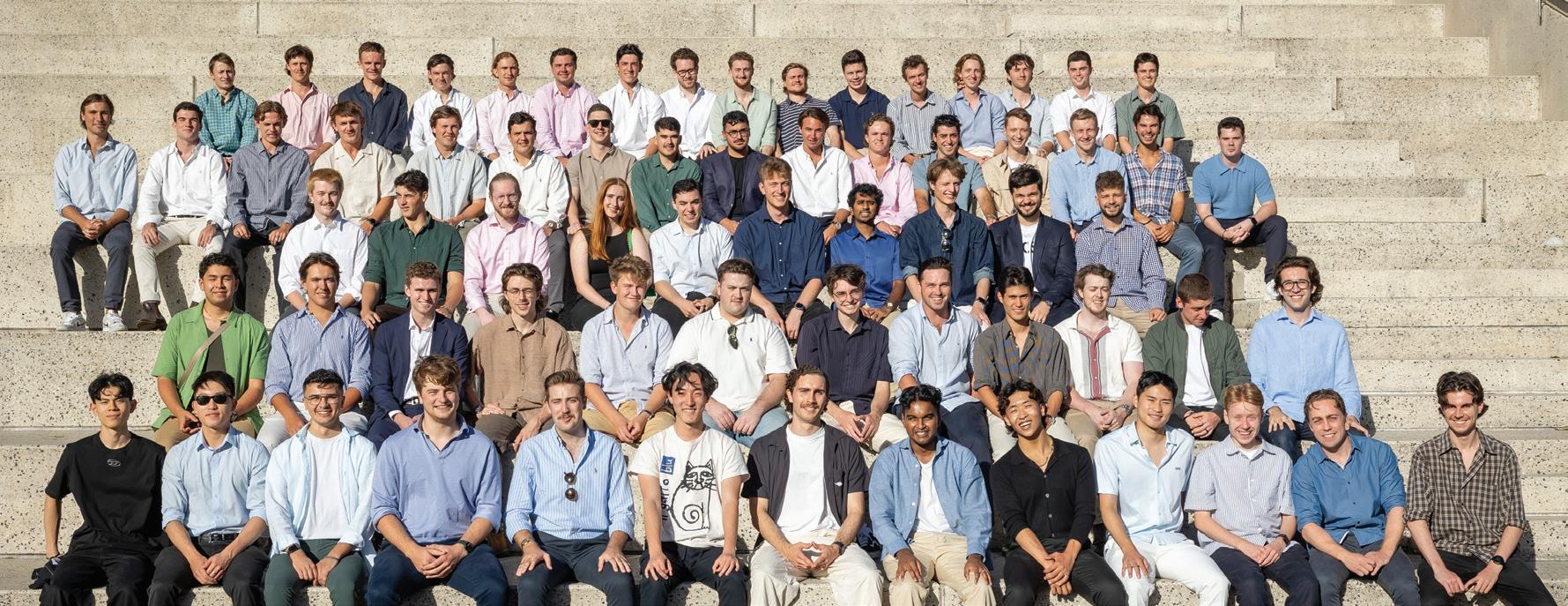
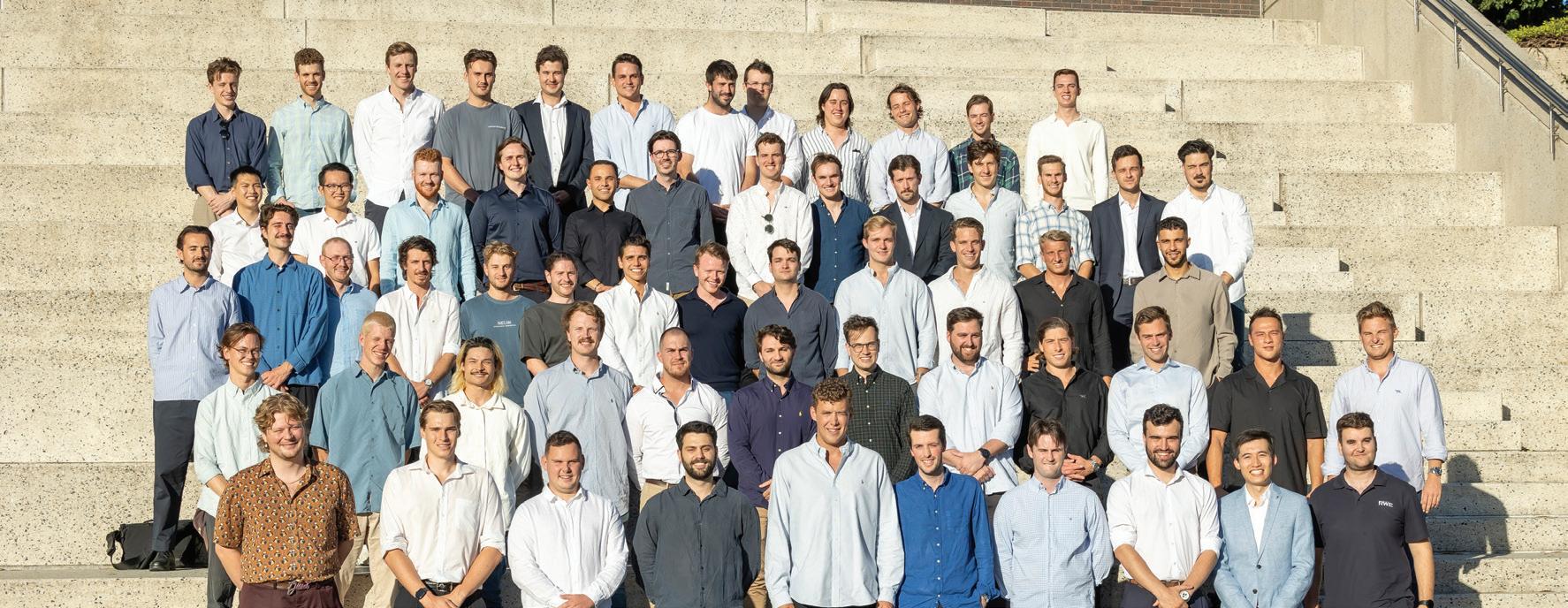


36 Melbourne Grammar School OLD MELBURNIANS 1 2 3 4


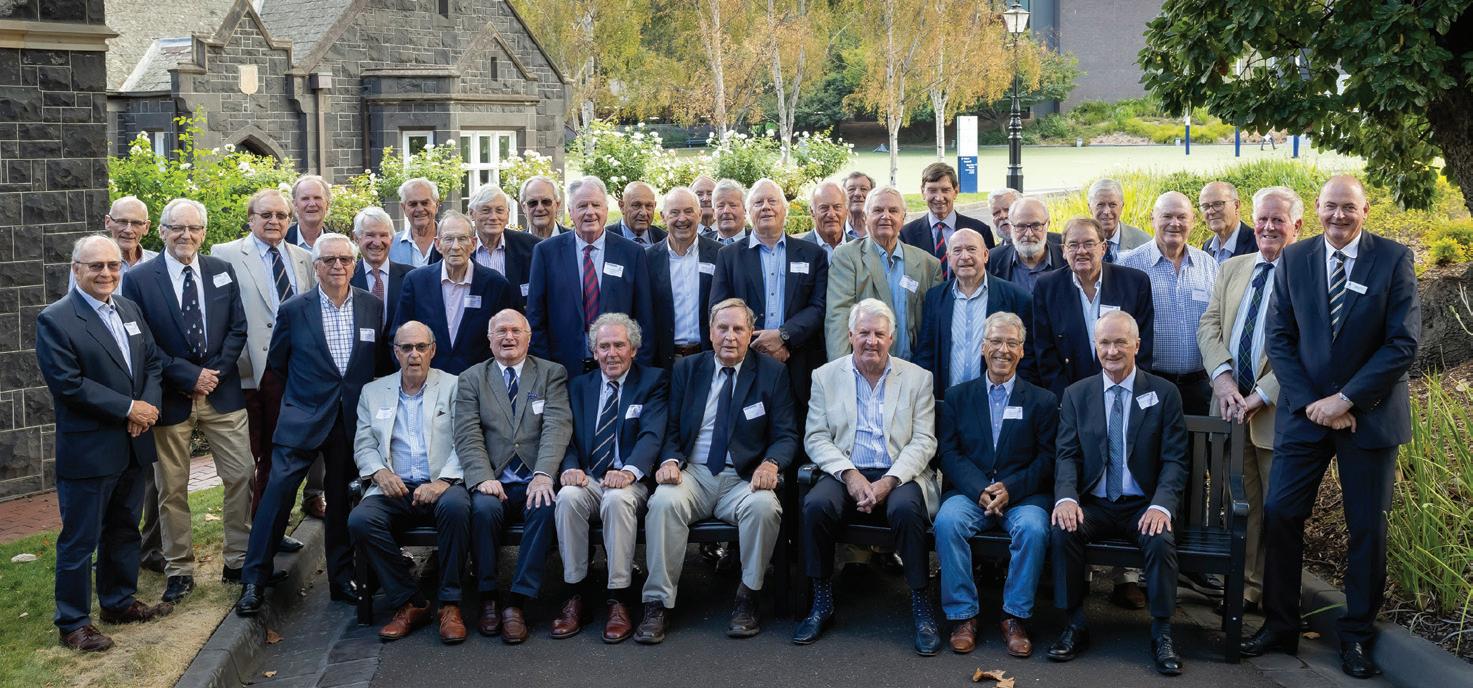
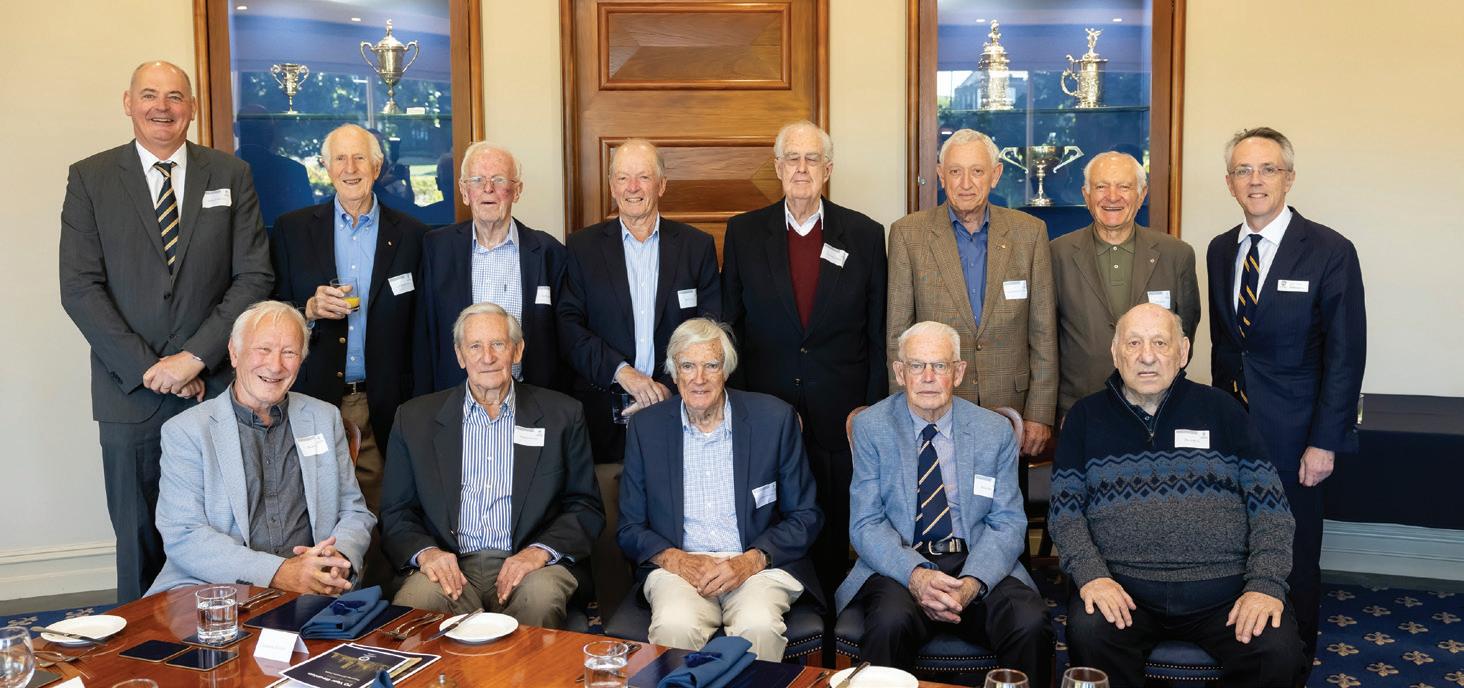
Additional images from Old Melburnian events are available at omlink.org
37 Grammar News No. 147 - April 2024
1. OM 2019 (5 year) Reunion 2. OM 2014 (10 Year) Reunion 3. OM 2004 (20 Year) Reunion 4. OM 1994 (30 Year) Reunion 5. OM 1984 (40 Year) Reunion 6. OM 1974 (50 Year) Reunion 7. OM 1964 (60 Year) Reunion 8. OM 1954 (70 Year) Reunion 5 6 7 8
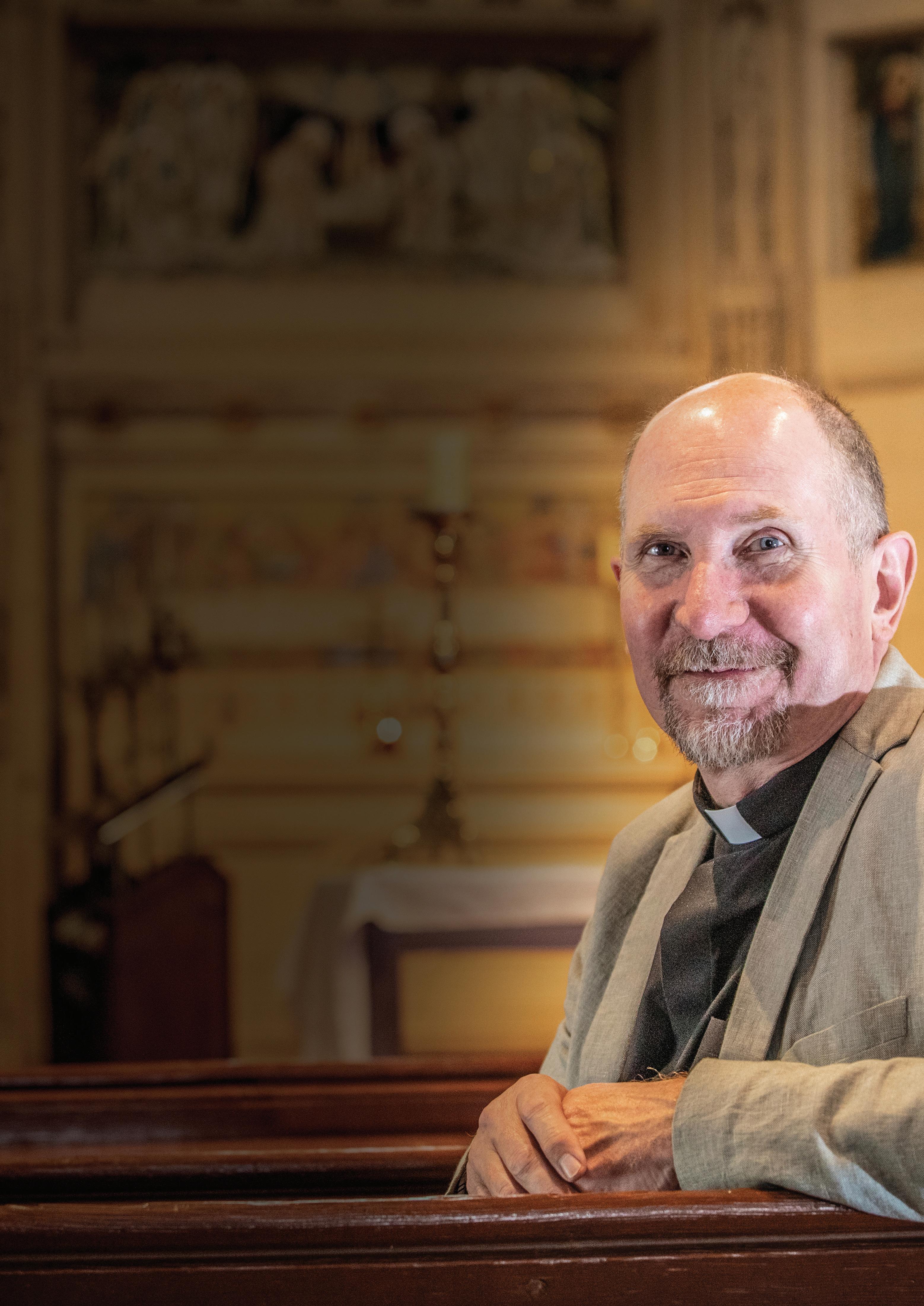
A Chaplain with a focus on inclusivity
The Rev’d Dr Hugh Kempster joined Melbourne Grammar School this year as Senior Chaplain. He is well known to the School community, having spent 2022 in the role when the Rev’d Hans Christiansen took long-service leave.
Hugh brings with him five years of experience as Senior Chaplain at Geelong Grammar School and almost 10 years as Vicar at St Peter’s Eastern Hill, Melbourne. Prior to this Hugh served as a Curate and Vicar in parish ministries in Auckland, New Zealand.
A PLACE TO BE STILL
“In many ways, a school is like a parish,” says Hugh. “First and foremost, it is a community and I see myself as one of the spiritual leaders of the Melbourne Grammar community enabling the celebration of Anglicanism in our chapels and more widely across the campuses.”
“The Chapel of St Peter is very much the heart of the South Yarra campus,” Hugh explains. “Every day there is there is some sort of activity within the Chapel, whether it be quiet prayer, the regular gatherings of each House to hear the scriptures and to reflect on them, the grand choral Eucharist every Friday, or students coming in between classes and lighting a candle.”
A recent Year 12 service, where students give the sermon, provided a poignant moment for Hugh. “One of the Year 12 students spoke about his journey through the Chapel. He wasn’t a person of faith, but he said he came into Chapel and initially wondered, ‘what is all this about? Why do I have to go to Chapel?’.”
“He then said that over time, he came to see that the Chapel is a place of welcome, a place to be still,” says Hugh. “A place in the busyness of school life, where he could just be. That was a gem for me, because that's what I hope all students in one way or another will get from their chapel experience.”
INCLUSIVITY IS A KEY FOCUS
“My role is also strongly pastoral,” he says. “Whether providing a shoulder to cry on for someone who is struggling in some way, or just being a friendly face in the Quad, I would like students, staff, parents and Old Melburnians to see me as someone who they can trust and who offers a ‘safe place’ for them to speak.”
Hugh says that inclusivity is strong within Anglicanism: “This is something I hold very dearly so I am pleased there is a very strong focus on that here at Melbourne Grammar.”
“Ultimately I hope students will see their school as an example of Christianity that is truly inclusive, that practices what it preaches, and that is a place of welcome throughout their lives,” Hugh says.
38 Melbourne Grammar School SCHOOL NEWS

OBITUARIES
The School has learnt of the following recent deaths in our community. We extend our sympathy to their families and friends.
Austin, P B (OM 1961)
Bond, R H (OM 1968)
Colebatch, T J (OM 1965)
Decker OAM, R McN (OM 1944)
Dobbie, N C (OM 1942)
Foots, K J (OM 1955)
Gillham, P F (OM 1972)
Gill, B N (OM 1956)
Greaves, E R (OM 1943)
Halford, B R (OM 1967)
Hannah, R T (OM 1945)
Harrison, A W (OM 1964)
Hill, A V L (OM 1950)
Hodges, W H (OM 1952)
Erratum
Humphreys, J R (OM 1953)
Kent, R W V (OM 1952)
Lee OAM, N C (OM 1944)
Mackay, A J C (OM 1952)
Miller, D C (OM 1954)
Montgomery AM OBE, J M (Former Council Member)
Payne, A McK (OM 1964)
Skillington, S L (OM 2007)
Spry, T M (OM 1955)
Stokes, M G (OM 1994)
Stuckey, J B (OM 1946)
Williams, C M (OM 1951)
Wilson, B S (OM 1959)
The list of obituaries published in our December 2023 edition of Grammar News included reference to the passing of R K Clayton (past staff member). This should have read K R Clayton. Our apologies for this error.
Obituaries 2010 to present
A full list of obituaries from 2010 is available at news.mgs.vic.edu.au
Do you have an obituary to report?
Please contact us if you are aware of a death in the Melbourne Grammar School community. mgs@mgs.vic.edu.au
39 Grammar News No. 147 - April 2024
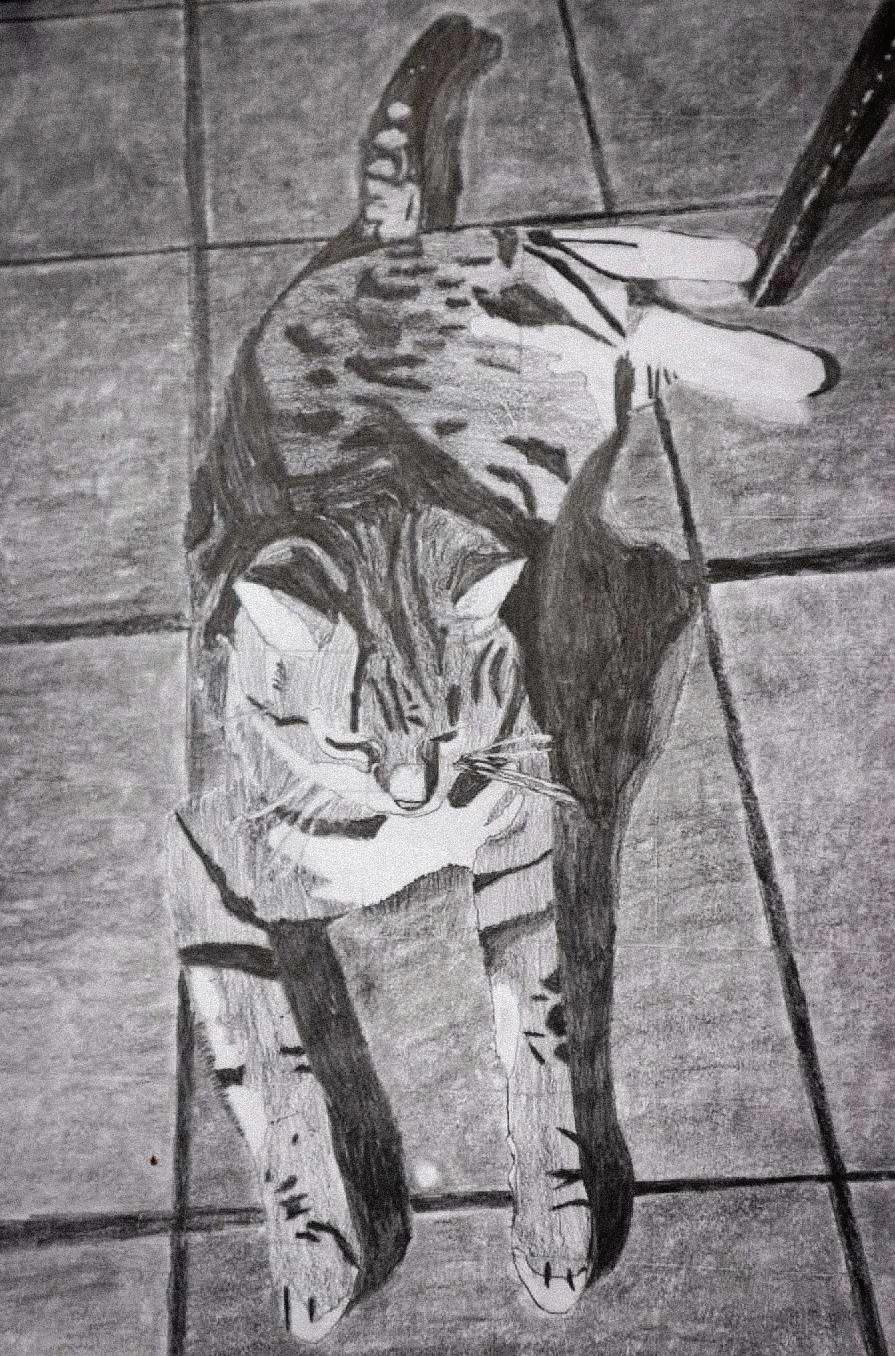

Melbourne Grammar School 355 St Kilda Road, Melbourne Victoria 3004 Australia +61 3 9865 7555 | mgs@mgs.vic.edu.au CRICOS No 00977J ABN 61 004 453 829 FEATURED ARTWORK Enzo Jonathan Vaughan, Year 7 (2023) Tonal pencil drawing on paper







 Philip Grutzner
Philip Grutzner























































































